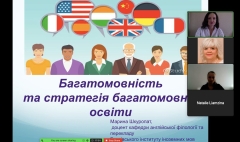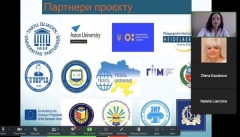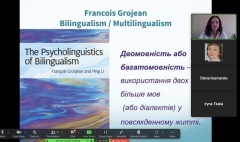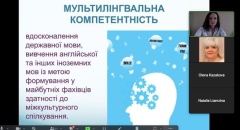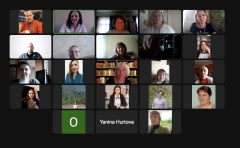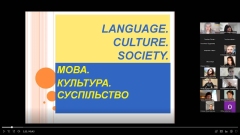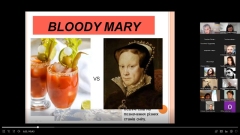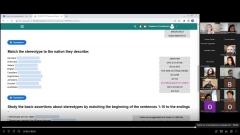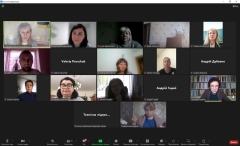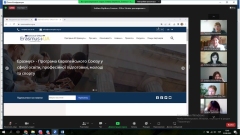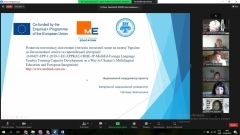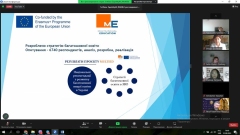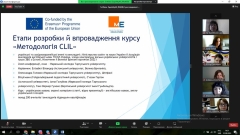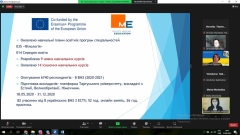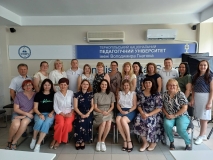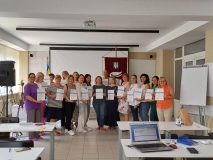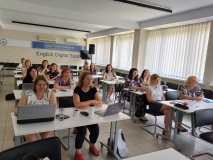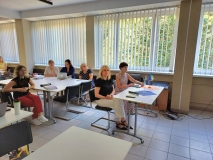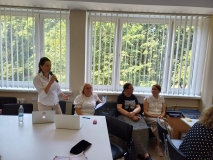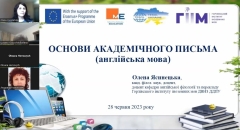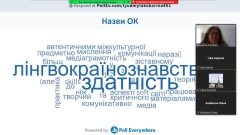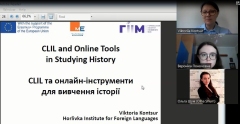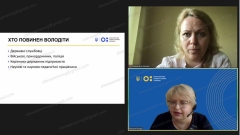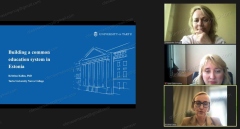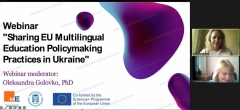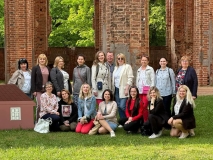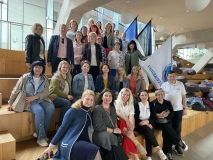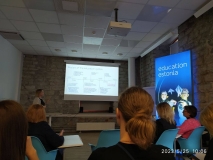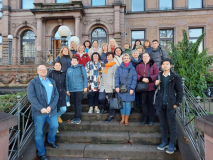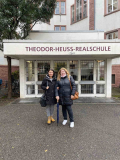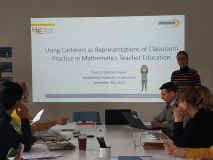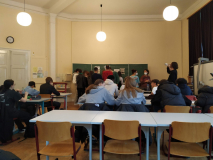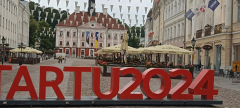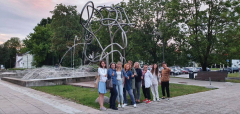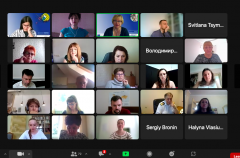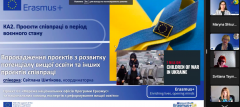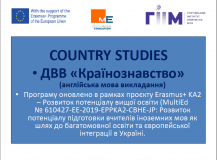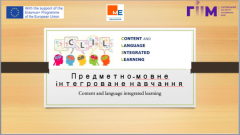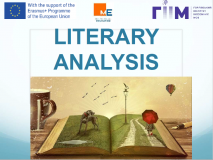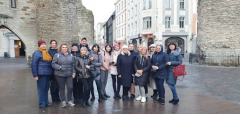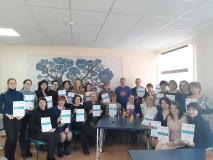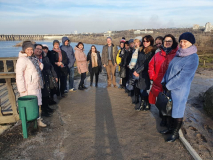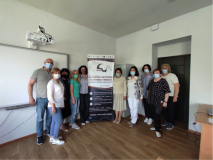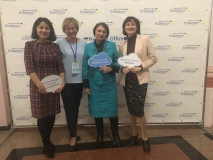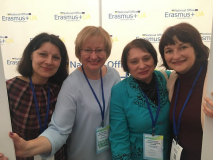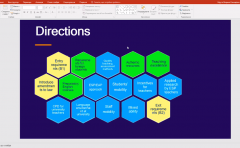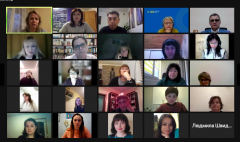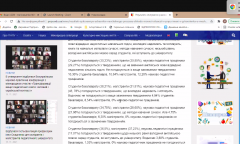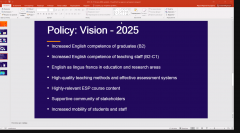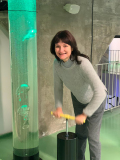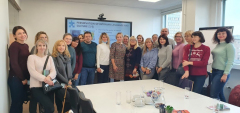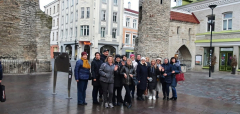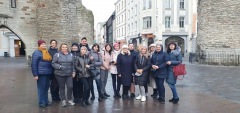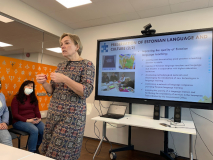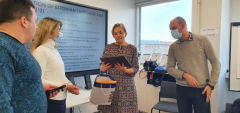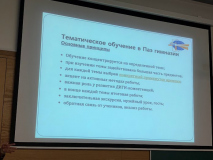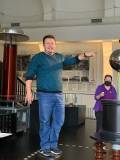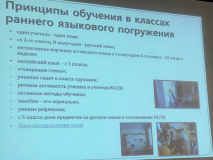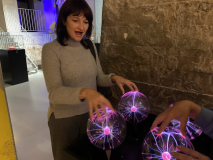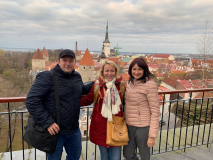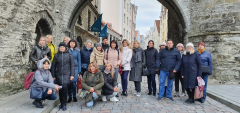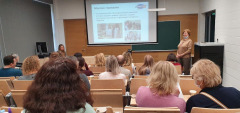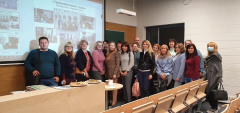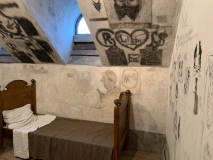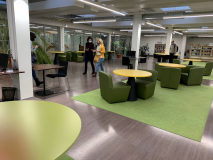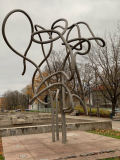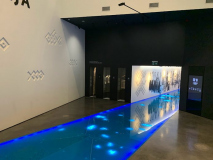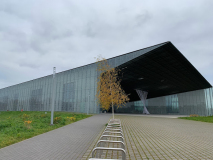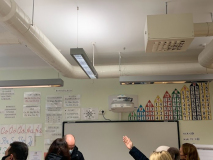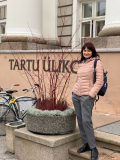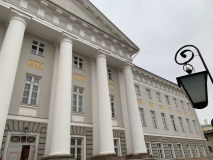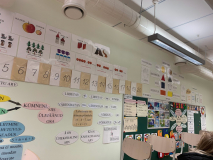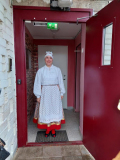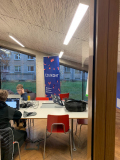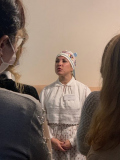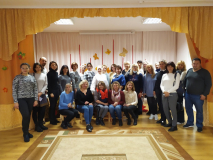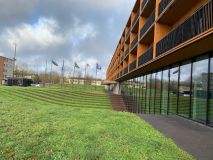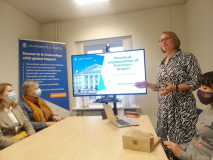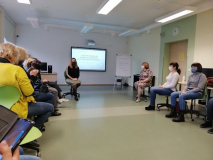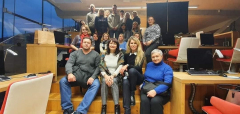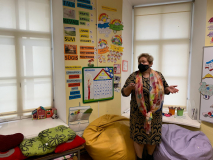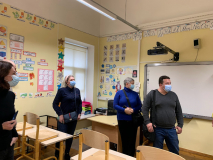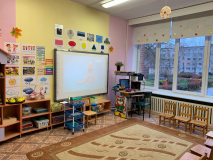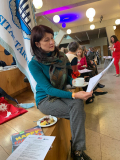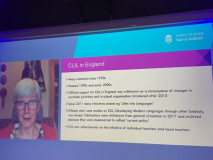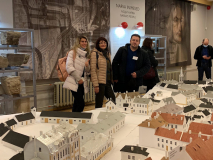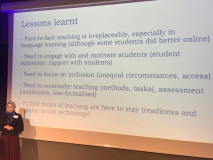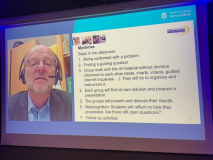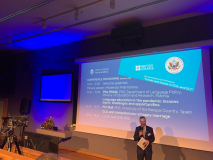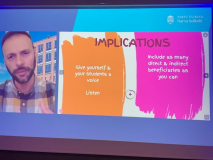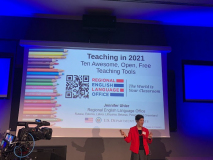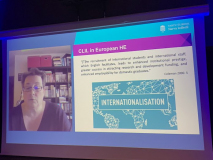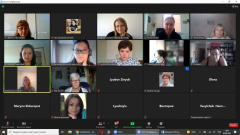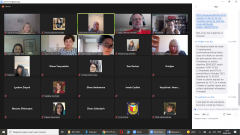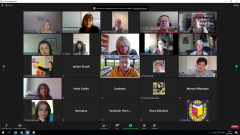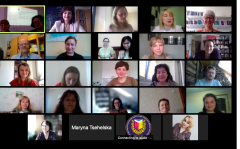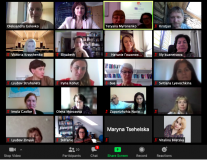

| Program or initiative | References | Title of the project | Beneficiary organization,
project value |
Duration |
| Erasmus + KA2 -
Capacity Building in the field of Higher Education Development of higher education potential |
610427-EE-2019-EPPKA2-CBHE-JP | MultiEd
Foreign Language Teacher Training Capacity Development as a Way to Ukraine's Multilingual Education and European Integration "Development of the potential of foreign language teacher training as a way to multilingual education and European integration in Ukraine" |
Consortium of European and Ukrainian Universities
€ 900,000 HIfFL 62226 € |
15.11.19 - 14.11.23 |
Institutional project coordinator from GIIM, chairman of the working group - Shkuropat M. Yu., Responsible for international cooperation;
Financial administrator - Svitlakova IV, acting chairman. accountant;
Project manager - Marchenko TM, Deputy Director for Scientific and Pedagogical and Educational and Methodological Work, Professor
Project executors:
Arkhipova IM - Associate Professor of German Languages;
Andrushchenko VO - Head of the Department of English Philology and Translation;
Kontsur VV - Associate Professor of Domestic and Foreign History;
Kokorina LV - Head of the Department of Pedagogy and Teaching Methods;
Korolyova O.Yu. - Senior Lecturer English philology and translation.
Pozhidayeva NP - Associate Professor of German Languages;
RM Sytnyak - Head of the Department of Germanic Languages;
Yasynetska OA - Associate Professor of English Philology and Translation.
Project assistants:
Bakutina PV - Lecturer of the Department of English Philology and Translation.
Potaptseva DO - lecturer at the Department of Germanic Languages;
Sokhatska GA - Lecturer of the Department of Germanic Languages.
Technical assistant:
Gladkikh SM, a leading electronics engineer.
Erasmus + Capacity Building Projects in the Field of Higher Education with Ukrainian Partners
EU Erasmus + projects in the field of higher education with the participation of higher education institutions from Ukraine
2019 Calls for Proposals Projects 2019 р.
|
Project logo |
Foreign Language Teacher Training Capacity Development as a Way to Ukraine's Multilingual Education and European Integration | ||
| Project acronym: MultiEd | |||
| Priority Higher Education, Teacher Training, Internationalization | |||
| Project duration: 15 November 2019 - 14 November2022 | |||
| EU funding instrument: European Neighborhood Instrument (Erasmus +: КА2 CBHE) | |||
| Erasmus + (CBHE) grant amount: 900099 | |||
| Target groups: university students, school teachers | |||
| Grant holder: Tartu University
|
Coordinator and General Manager:Christian Klauks | ||
| Partnership:
§ Heidelberg University, Germany § Aston University, UK § Interlink Academy, Germany (NGO) § Zaporizhzhia National University, Ukraine § Mykolaiv National University, Ukraine § Cherkasy National University, Ukraine § Poltava National Pedagogical University, Ukraine § Karazin Kharkiv National University, Ukraine |
§ Horlivka Institute of Foreign Languages, Ukraine
§ Ternopil Volodymur Hnatiuk National Pedagogical University, Ukraine § Ivano-Frankivsk National University, Ukraine § Ministry of Education of Ukraine, Ukraine § Teacher Association “TESOL-Ukraine”, Ukraine (NHO) |
||
| Projectgoalsandobjectives:
The project's goals are: 1. Curriculum of Teacher of Foreign Languages development. 2. Education of in-service teachers (both school and university teachers, academic staff). 3. Internationalization of education through launching CLIL-based courses and developing multilingual education strategies for UA HEIs and National Recommendations on Multilingual Higher Education.
The project's objectives are: 1. to train academic and professional staff teams; 2. to review and audit all current curricula in the field of Education (BA and MA of TFLs); 3. to update on average 14 courses for BA and MA of; 4. to deliver and evaluate courses (both new and updated through CLIL approach); 5. to launch, pilot and introduce on a regular basis the revised curricula; 6. to train academic and professional staff on e-course development; 7. to develop, deliver and evaluate e-course “CLIL Methodology” for target groups; 8. to survey public opinion on “Multilingual education in Ukraine; 9. to embed the ideas of life-long learning and blended education with academic and professional staff; 10. to design and deliver seminars on new pedagogical approaches, CLIL & ELT (English Language Teaching) methods, career-relevant general skills development for target groups. |
|||
| Activities:
|
|||
| Expected results:
|
|||
| Project coordinator in Ukraine: | |||
| Zaporizhzhia National University, znu.edu.ua.
+38 (061) 228-75-08 Responsible person: OLEKSANDRA GOLOVKO, Associate Professor of English Translation Department Contact: +380664303234, alesia.golovko@gmail.com |
|||
| Partners from Ukraine: | |||
| VOSukhomlynskyi National University of Mykolaiv, mdu.edu.ua
+38(0512)37-88-38
Vasyl Stefanyk Precarpathian National University, pnu.edu.ua +380342531574 Responsible person: NATALIIA GOSHYLYK, Associate Professor of the English Philology Department Contact: +380668567909, ngoshylyk@gmail.com
Poltava VG Korolenko National Pedagogical University, pnpu.edu.ua +38 (053) 256-23-13 Responsible person: IRYNA KOHUT, Head of the Department of Innovation and International Relation Contact: +380958870205, irynakohut15@gmail.com
Non-Governmental Organization «Association of Teachers of English» TESOL-Ukraine », www.tesol-ukraine.com +38 (050) 109-46-53 Responsible person: MARYNA TSEHELSKA, Vice-President Contact: +380674930983, mtsehelska4@yahoo.com
Ternopil Volodymyr Hnatiuk National Pedagogical University; www. tnpu.edu.ua tel .: +380352436024, fax: +380352436055 Responsible person: Lyubov STRUHANETS, Dr (Hab) in Philology, Professor of the Department of the Ukrainian Language and Methods of Teaching Contacts: tel.: +380989878266, e-mail: lyubovstruhanets@yahoo.com |
Horlivka Institute for Foreign Languages of State Higher Education Institution “Donbas State Pedagogical University”, giim@forlan.org.ua
+38 (06274) 2-25-37 Responsible person: MARYNA SHKUROPAT, Associate Professor of English Philology and Translation Department Contact: +380504716586, marysh911@gmail.com
Cherkasy National University, cdu.edu.ua +38(0472) 37 35 71 Responsible person: OLENA RADCHENKO, Associate Professor of the Chair of Conversational English Contact: +380672437840, radelena2009@ gmail.com
|
||
| Project web-site: | |||
|
Project logo
|
Project name Development of the potential of training foreign language teachers on the way of Ukraine to the introduction of multilingual education and European integration |
||
| Short name of the project: MultiEd | |||
| PriorityHigher education, teacher training, internationalization | |||
| Project duration: November 15, 2019 - November 14, 2022 | |||
| EU funding program: European Neighborhood Instrument (Erasmus +: KA2 CBHE) | |||
| Erasmus + Grant Amount (CBHE): 900099 | |||
| Target group:university students, school teachers | |||
| Grant recipient: University of Tartu (Estonia)
|
Coordinator: Christian Klaux
|
||
| Partnership:
§ Heidelberg Pedagogical University (Germany), § Aston University (Britain), § Interlink Academy (NGO, Germany), § Zaporizhia National University, § Nikolaev National University, § Cherkasy National University, § Poltava National Pedagogical University, |
§ Kharkiv National University,
§ Horlivka Institute of Foreign Languages, § Ternopil National Pedagogical University, § Ivano-Frankivsk National University, § Ministry of Education and Science of Ukraine, All-Ukrainian Association of English Language Teachers "TESOL - Ukraine" (NGO). |
||
| Purpose and objectives of the project:
Project goals: 1. Update the curriculum for the development of foreign language teachers. 2. Teacher training (both schools and universities). 3. Internationalization of education through the launch of CLIL-based courses and the development of multilingual education strategies for higher education institutions and National Guidelines for Multilingual Higher Education. The objectives of the project are: 1. to improve the skills of university teachers; 2. review and check current curricula in the field of education (BA and MA of foreign language teachers); 3. update an average of 14 undergraduate and graduate courses; 4. implement and evaluate courses (both new and updated through the CLIL approach); 5. to pilot revised training programs; 6. to improve the skills of personnel in the development of electronic courses; 7. develop and implement an electronic course "Methodology CLIL" for target groups; 8. to study public opinion on the topic "Multilingual education in Ukraine; 9. disseminate lifelong learning ideas for teachers; 10. develop and conduct seminars on new pedagogical approaches, CLIL & ELT methods to develop general skills for target groups. |
|||
| Areas of project activity:
|
|||
|
|||
| Project coordinator from Ukraine: | |||
| Zaporizhia National University, I know.edu.ua
+38 (061) 228-75-08 Responsible: OLEKSANDRA GOLOVKO, Associate Professor of Theory and Practice of English Translation Contacts: +380664303234, alesia.head@gmail.com |
|||
| Partners from Ukraine: | |||
| Nikolaev National University named after VO Sukhomlinsky. mdu, edu, ua
+38(0512)37-88-38
Vasyl Stefanyk Precarpathian National University pnu.edu.ua +380342531574 Responsible: Natalia Goshilyk, Associate Professor of English Philology Contacts: +380668567909 ngoshylyk@gmail.com
Poltava National Pedagogical University named after VG Korolenko, пнпу.edu.ua +38 (053) 256-23-13 Responsible: IRINA KOHUT, head of the department of innovation and international connections Contacts: +380958870205, irynakohut15 @gmail.com
NGO "Association of English Teachers" TISOL-Ukraine ", www.tesol–Ukraine.com +38 (050) 109-46-53 Responsible: MARINA TSEGELSKA, Vice President Contacts: +380674930983, mtsehelska4@yahoo.com
Ternopil National Pedagogical University named after Volodymyr Hnatyuk; www. tnpu.edu.ua tel .: +380352436024; fax: +380352436055 Responsible person: Lyubov STRUGANETS Doctor of Philology, Professor of the Department of Ukrainian Language and Methods of Teaching Contacts: te-mail: +380989878266 email address: lyubovstruhanets@yahoo.com |
Horlivka Institute of Foreign Languages of the State Higher Educational Institution “Donbas State Pedagogical University”, giim@forlan.org.ua
+38 (06274) 2-25-37 Responsible: MARINA SHKUROPAT, Associate Professor of English Philology and Translation Contacts: +380504716586, marysh911@gmail.com
Cherkasy National University, cdu.edu.ua +38(0472) 37 35 71 Responsible: OLENA RADCHENKO, Associate Professor of English Language Practice Contacts: +380672437840, radelena2009@ gmail.com
|
||
| Project site: | |||


PROJECT
MultiEd "Development of training potential for foreign language teachers as a way to multilingual education and European integration in Ukraine"
Project results dissemination activities, October 2023.
At the end of the project, the MultiEd partnership planned and conducted a number of large-scale online events to disseminate the project's results.
It took place on September 26, 2023 MultiEd international online conference "Multilingual education: prospects for Ukraine"
Moderator – Oleksandra Golovko (Tartus University)
Speakers:
• Speaker 1. "Multilingual didactics" rector of the Heidelberg Pedagogical University, prof. Hans-Werner Huneke (Germany)
• Speaker 2. "Institutional reforms regarding quality teaching, learning and use of the English language in higher education in Ukraine" state expert of the Ministry of Education and Culture of Ukraine Oleksandra Laktionova (Ukraine)
• Speaker 3. "Implementation of multilingual education strategy: achievements and challenges (results of the MultiEd project under the patronage of the Erasmus+ program)" PhD Svitlana Zapolskyi (Zaporizhsky National University)
TESOL issued 303 certificates to participants.
WITH 13 to 30 October a series of workshops of the MultiEd professional development course on the topic "Dissemination of the main results of MultiEd" was held.
On October 13, participants could listen to speeches on the following topics:
Seminar 1. Curriculum development: exchange of experience and advice of Doctor of Philosophy Irina Morozova (KhNU)
Seminar Section 2: Multilingualism and the strategy of multilingual education, Candidate of Sciences Maryna Shkuropat (GIIIM)
Seminar 3: Electronic course "CLIL Methodology" Doctor of Economics Natalia Ivanotchak and Ph.D. Ludmila Babii (TNPU)
TESOL issued 70 certificates to participants.
October 20, 2023, workshop 2.
Seminar 1: Methodological CLIL course of Anna Kotova, PhD (TNPU)
Workshop 2: Teaching CLIL-based academic writing in higher education from Dr. Gabil, Professor Olena Vovk and Doctor of Philosophy Victoria Tokarchuk. (ChNU)
Workshop 3: Textbook on infomedia literacy and critical thinking: basis and recommendations for effective use from teacher Vitalina Biletska (PNU)
Workshop 4: "Language, Culture and Society" course and a textbook for the Ph.D. Ludmila Suhovetska and Ph.D. Viktoriya Andrushchenko (HIIM)
TESOL issued 76 certificates to participants.
October 27, 2023, workshop 3.
Seminar 1: Application of hard and soft CLIL approaches in the formation of professional competence of undergraduate students, candidates Iryna Shevchenko and Olena Shcherbakova (MNU)
Workshop 2: The impact of MultiEd on the master's programs of Doctor of Philosophy Olga Dovbush (TNPU)
Seminar 3: The impact of MultiEd on educational programs of doctoral sciences, Professor Maryna Zuyenko and Doctor of Philosophy Vikoriya Kravchenko
TESOL issued 93 certificates to participants
The final networking webinar of the "Beyond MultiEd" project took place October 30, 2023
Seminar 1: Cooperation with European universities within the framework of the Erasmus+ program from the head of the NEO – Ukraine project, Kateryna Zhdanova
Workshop 2: Writing Erasmus+ projects: getting ideas from the air from MultiEd project coordinator Oleksandra Golovko
Workshop 3:
3.1. Erasmus+ Jean Monnet Actions Projects: Secrets of Successful Application by Dr. Habil Olena Tupakhina
3.2. Erasmus+ Projects: From Idea to Strategy by Dr. Habil Iryna Zadorozhna
3.3. Erasmus+ KA2: How we started from scratch (Confessions of beginners) prof. Maryna Zuyenko and Doctor of Philosophy Nataliya Hertsovska
3.4 Erasmus+ KA171: How to join academic exchange projects PhD Natalia Slyvka
TESOL issued 116 certificates to participants
Study visit to Aston University
On October 2-6, 2023, representatives of partner educational institutions visited Aston University in Birmingham (England) as part of the Erasmus+ MultiEd project. The topic of the visit is "Multilingualism in education, the experience of Great Britain". The GIIIM team was represented by: Tetyana Marchenko – deputy director for scientific-pedagogical and educational-methodical work, Maryna Shkuropat – responsible for international activities, project manager, and Olena Yasinetska – associate professor of the Department of English Philology and Translation. The visit program and organizational support was provided by Susan Garton, professor at Aston University.


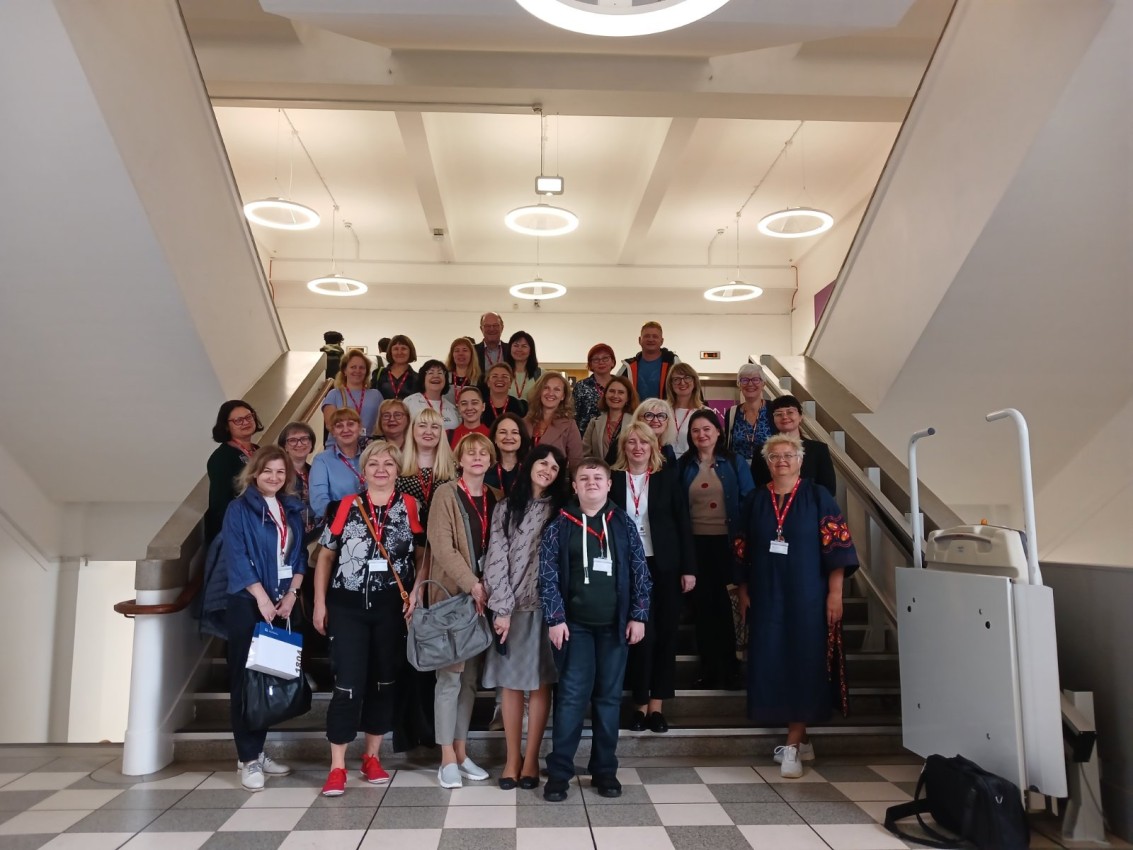
During the visit, there was an introduction to the university campus, educational buildings, the English language department, and the student club. The guests noticed that the Aston University campus is distinguished by the cultural and national diversity of the student body, therefore the main principles of communication in Aston are inclusiveness, respect for differences, racial and religious tolerance.
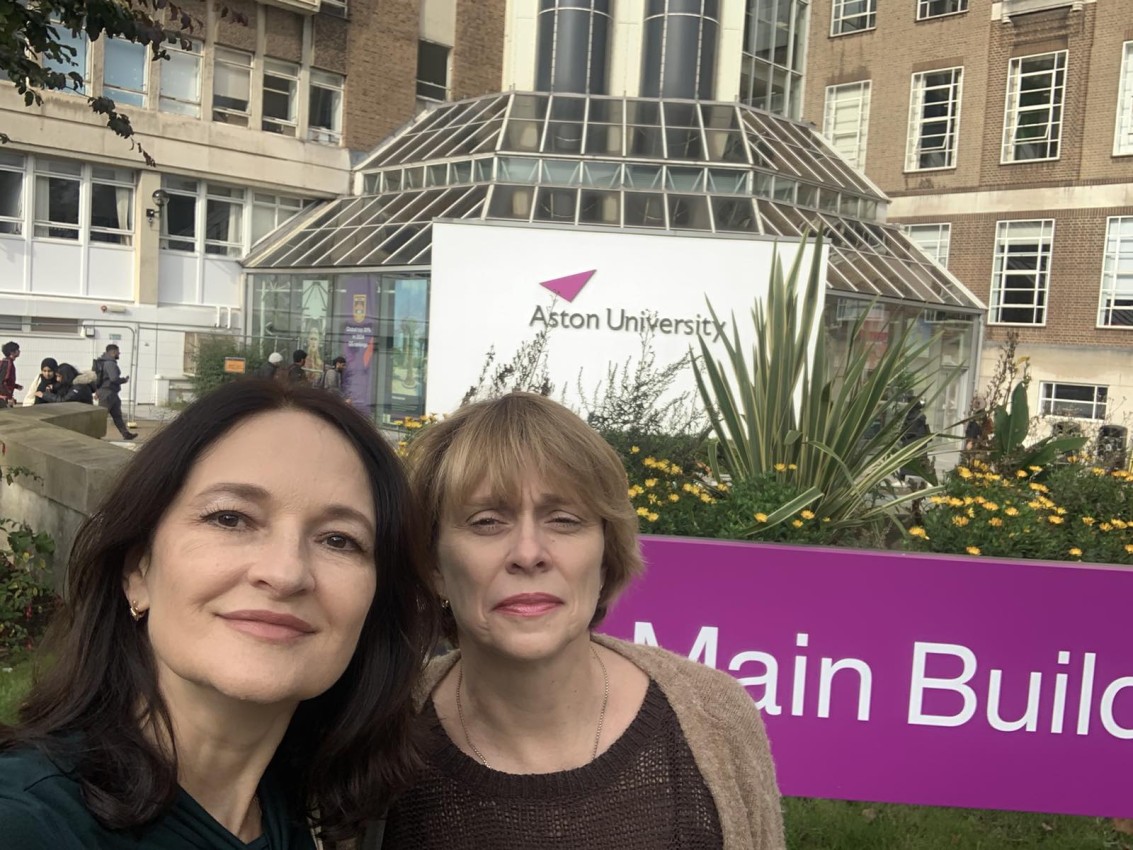

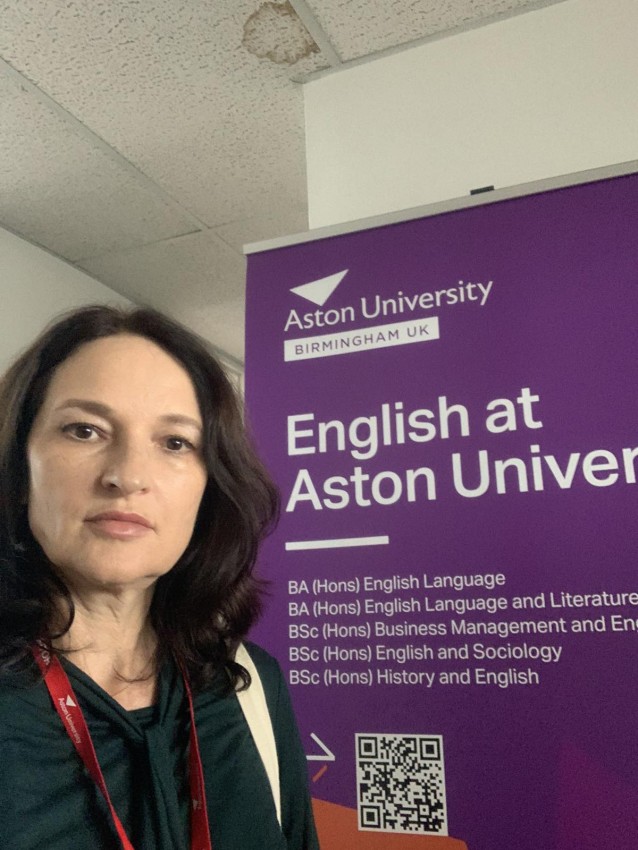
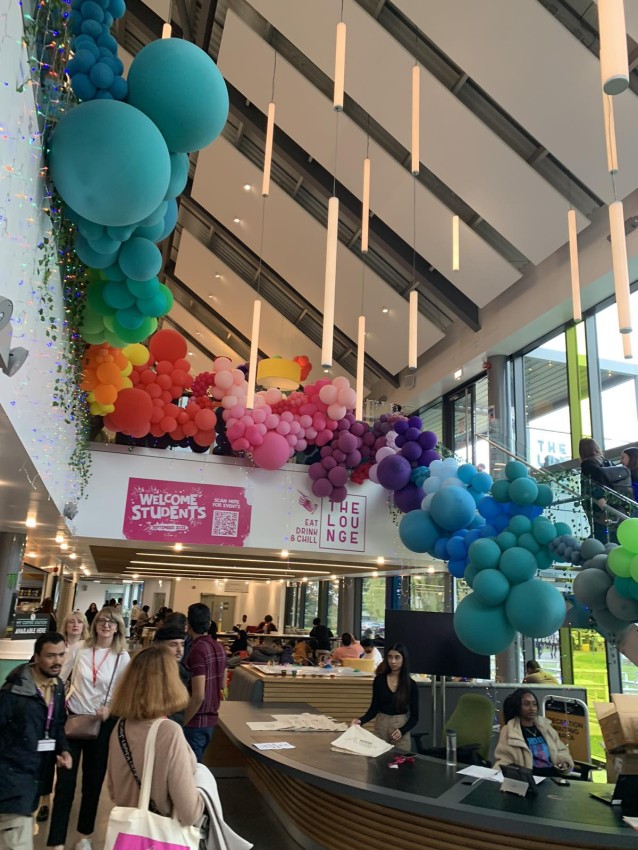

Among the topics discussed at the seminars were those that covered the issues of pedagogical interaction between participants in the educational process, the creation of adequate forms of assessment and the effective use of various artificial intelligence resources in the educational process. Visiting professors Donald Freeman and Kathleen Graves of the University of Michigan, as well as professors Gayatri Patel and Chris Umphreville, administrators of educational programs at Aston University, shared their opinions, scientific conclusions and practical experience.
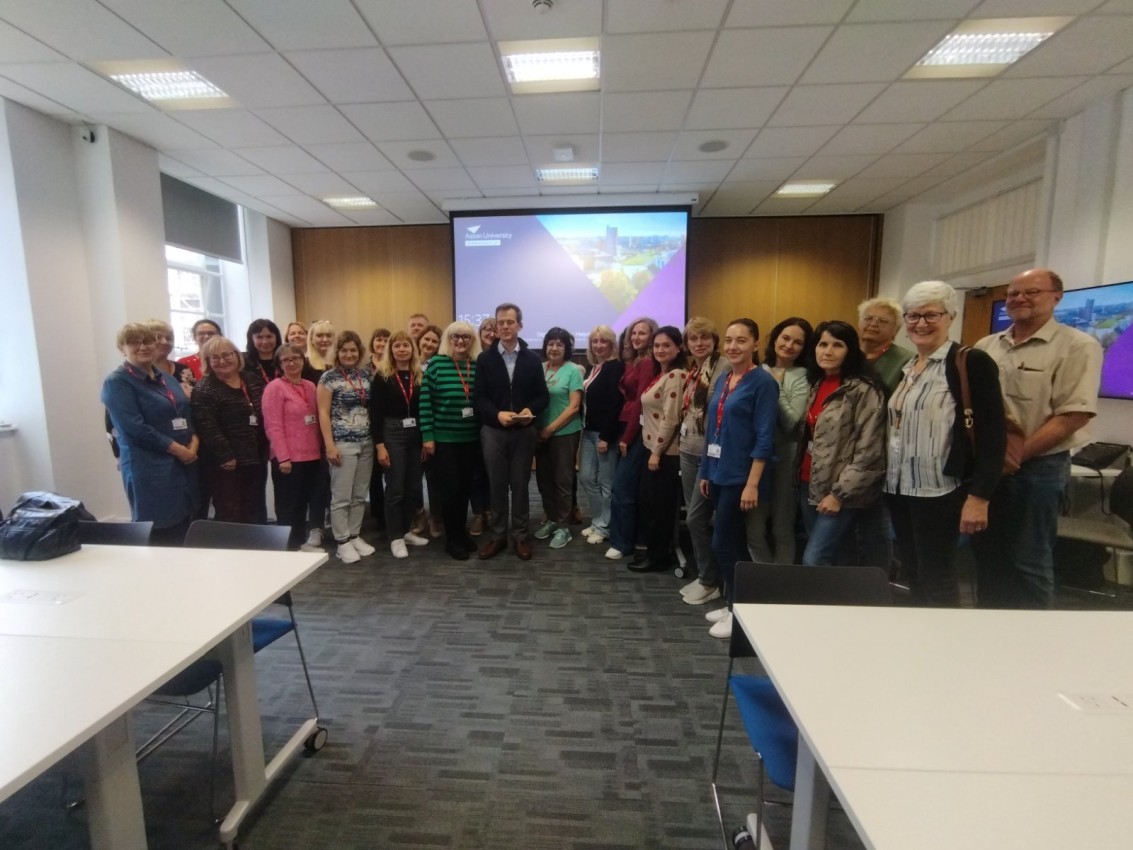
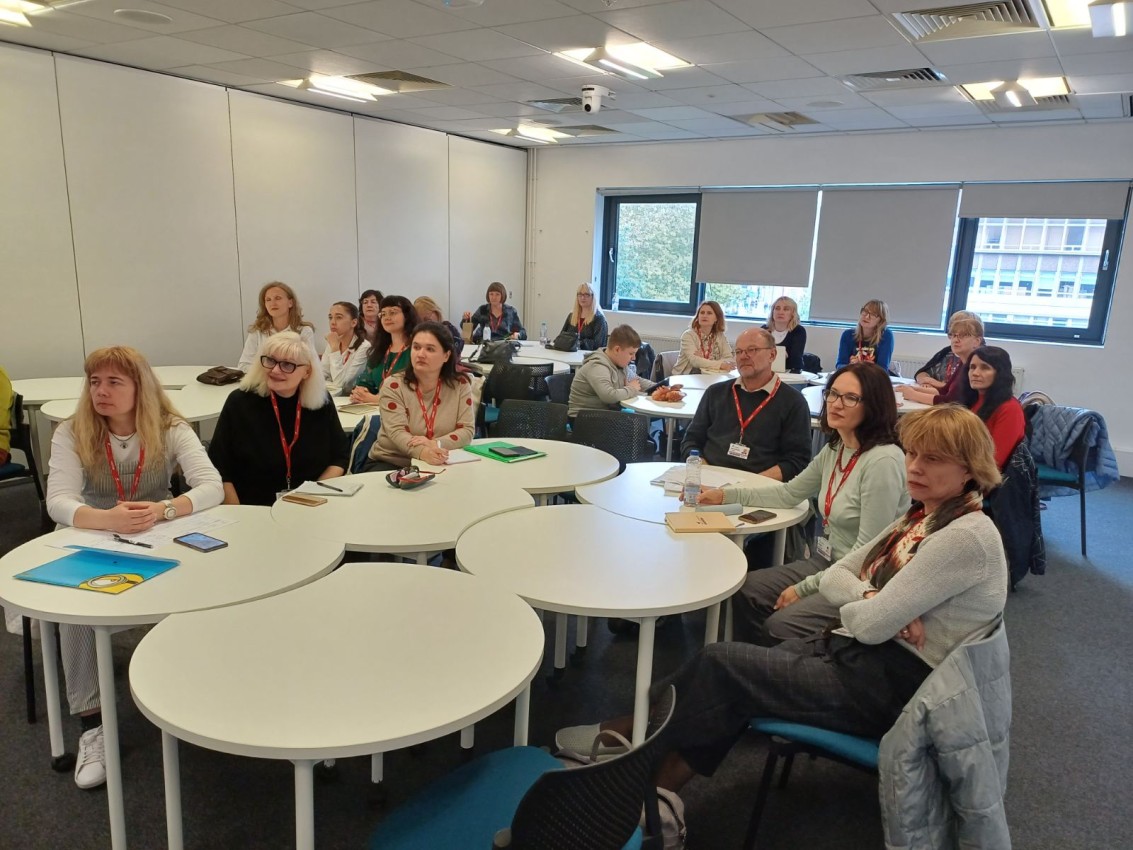

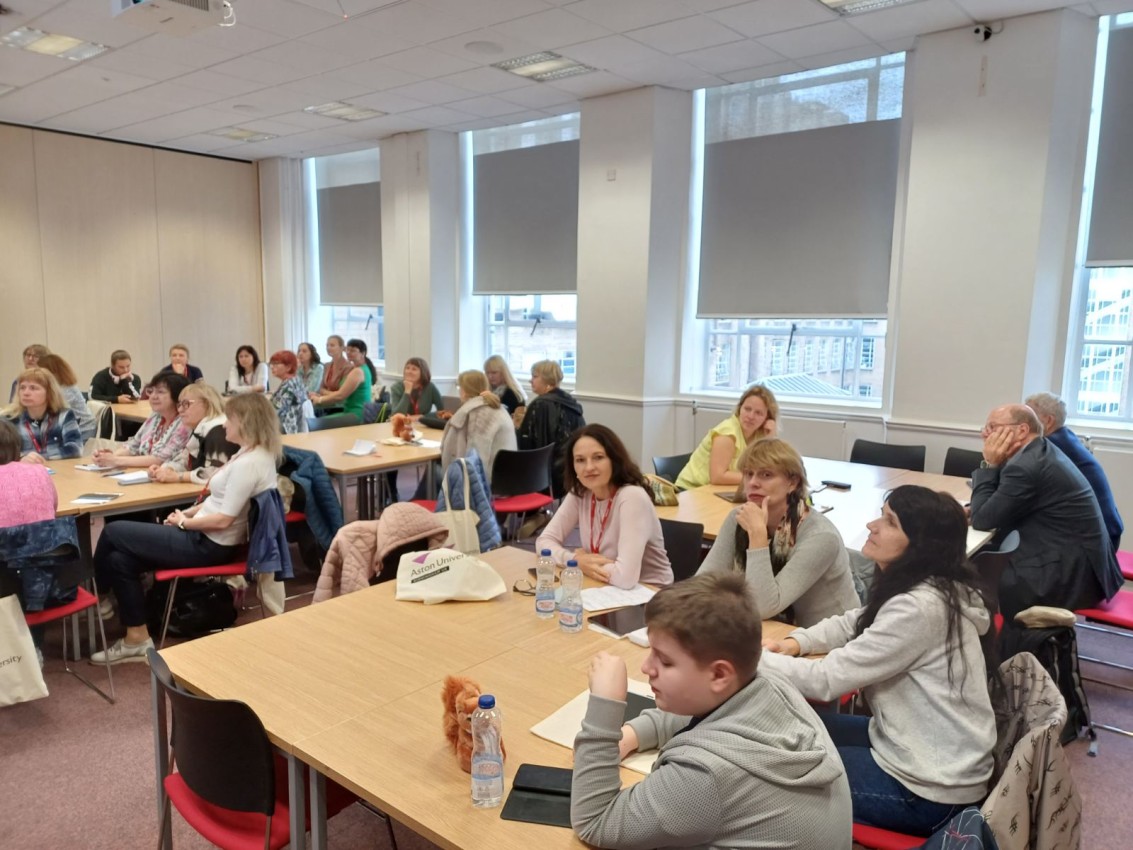
Professor Noor Huton told the participants of the visit about the achievements of the Erasmus + TEFE (Teachers of English for Future Europe) project, which was implemented in parallel with the MultiEd project by a team of English language teachers of Aston University together with other European partners. She emphasized the importance of using the principles of intercultural communication to take into account different approaches to teaching English in national education systems. All participants received certificates.

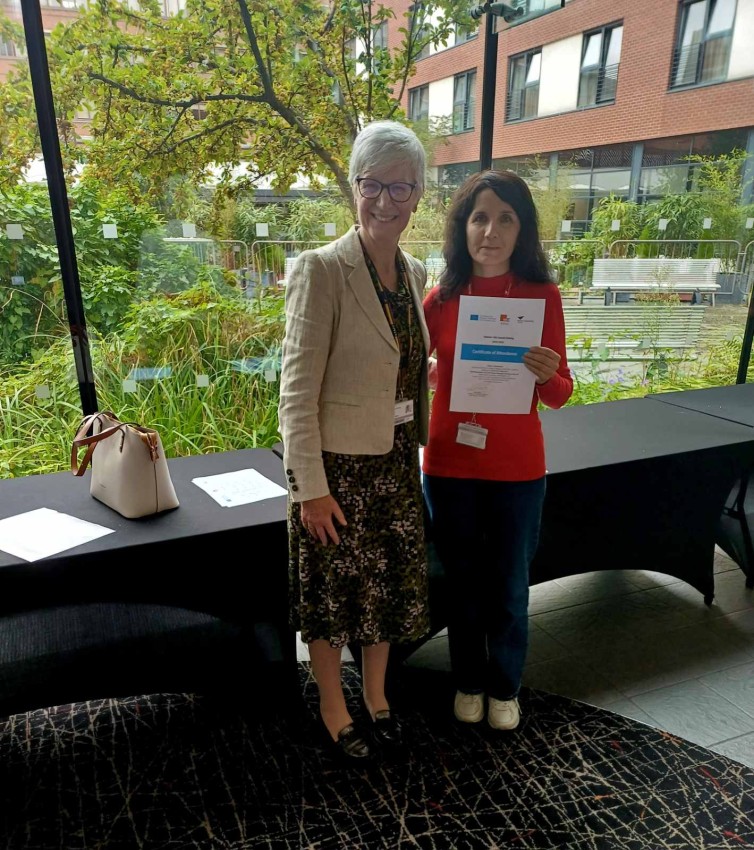
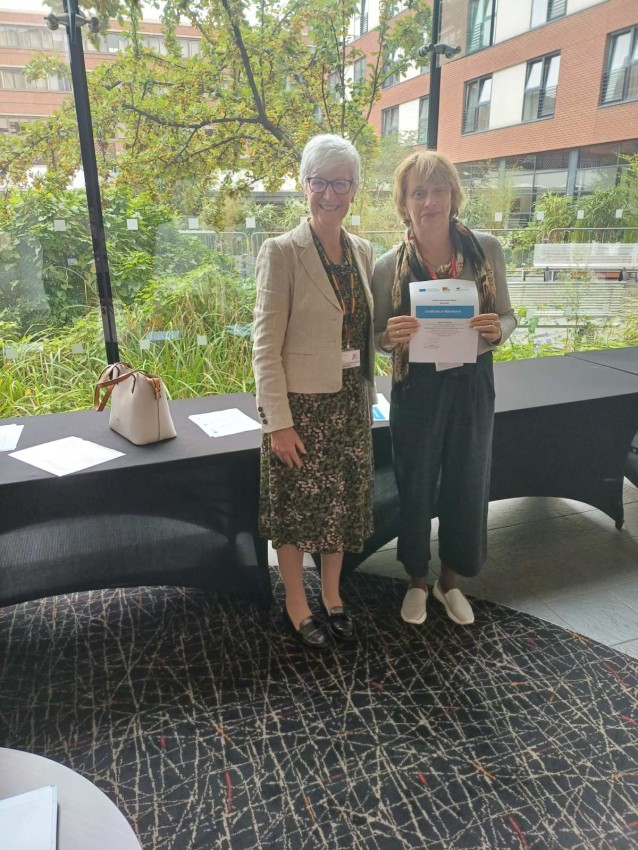

In addition to purely educational topics, the participants of the visit were offered a cultural program - a visit to the city of Stretford-on-Avon, where the outstanding poet and playwright, the founder of the literary English language, William Shakespeare was born. The city, which has preserved the spirit of the Renaissance and a unique historical flavor, attracts millions of tourists. Many monuments are associated with the name of Shakespeare, the modern theater creates productions of his dramatic works.




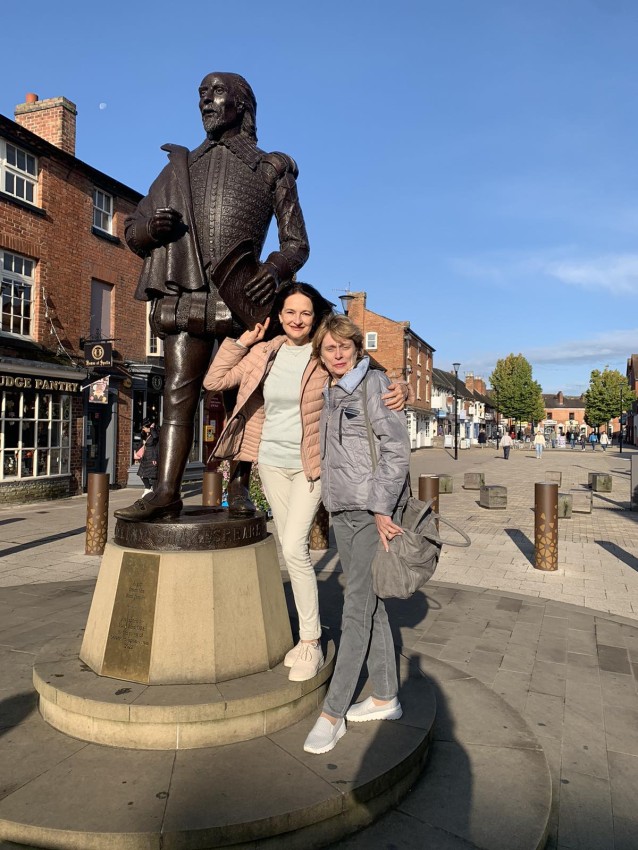

On the last day of the visit, the representatives of the Ukrainian teams were welcomed by the Birmingham City Hall staff. In particular, they talked about the enormous work with Ukrainian refugees that the Department of Social Protection has been doing since the beginning of the war.
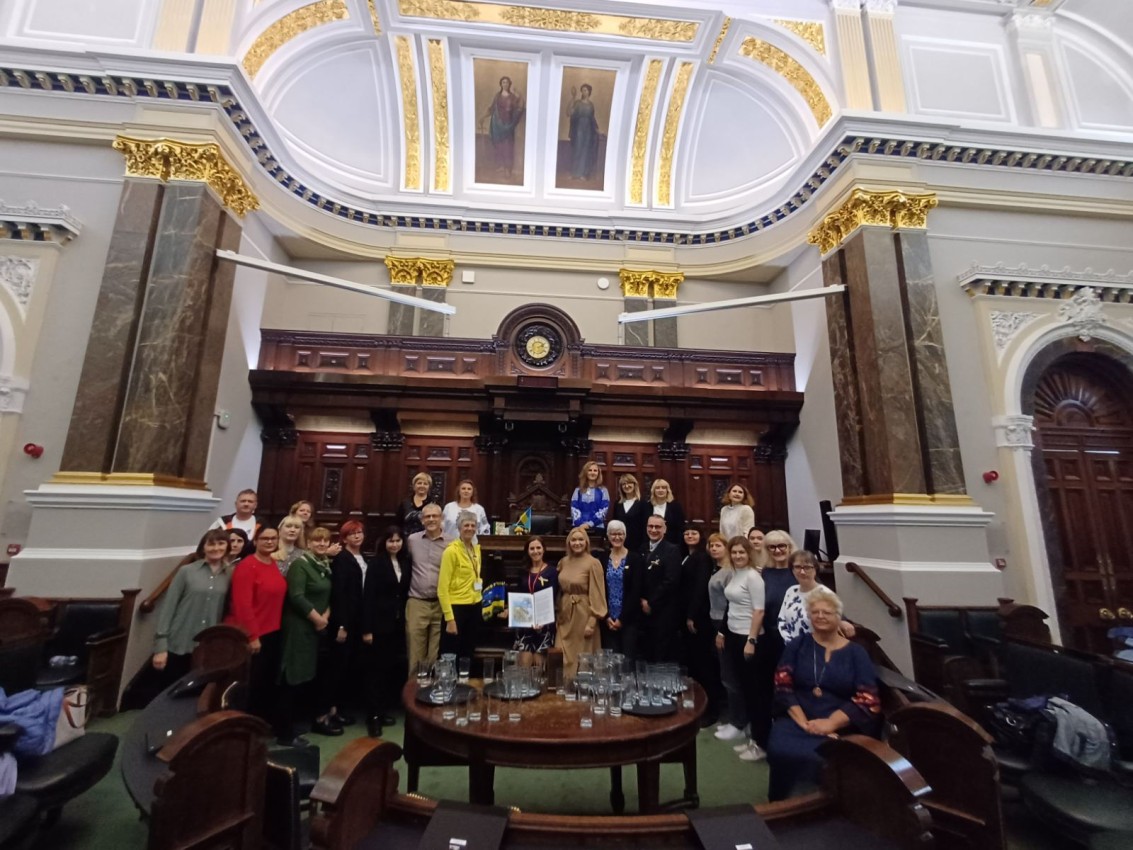
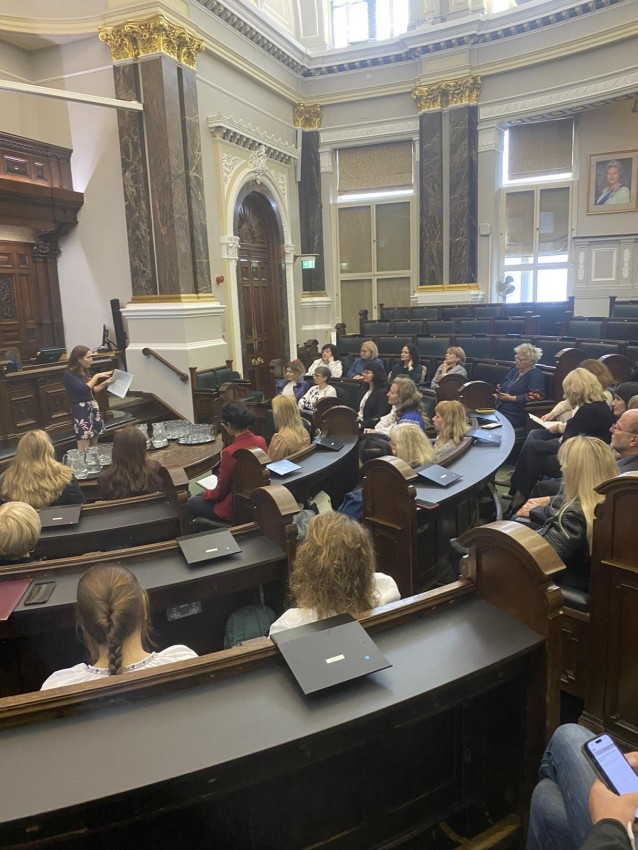
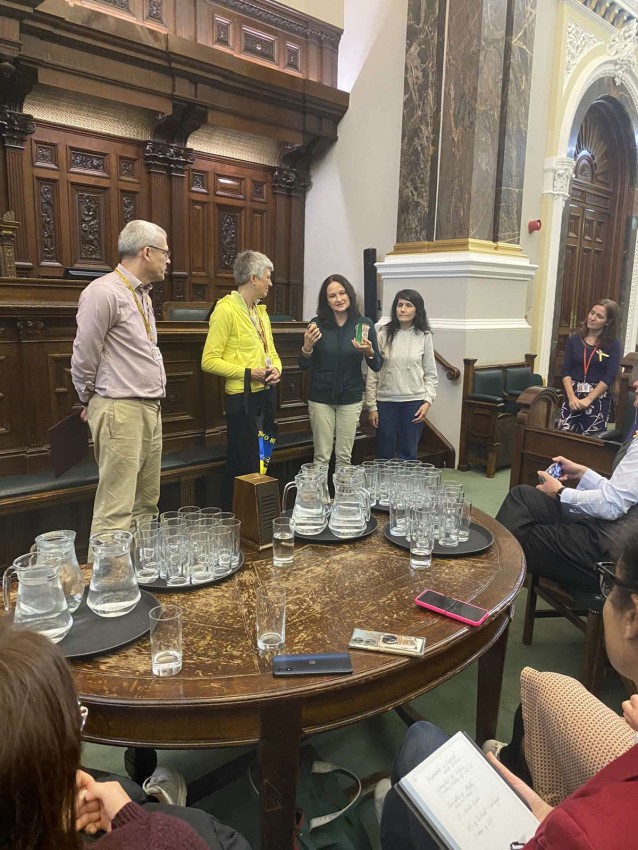
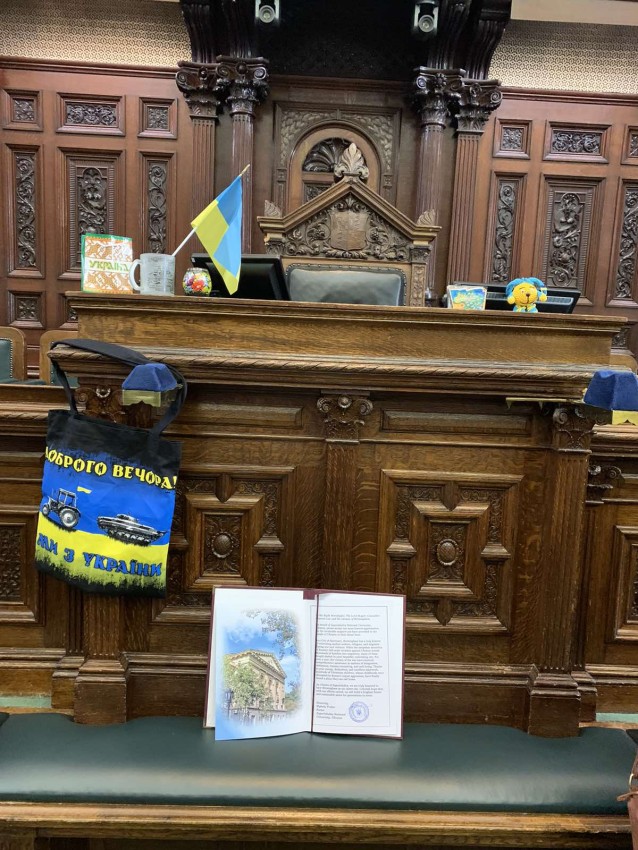
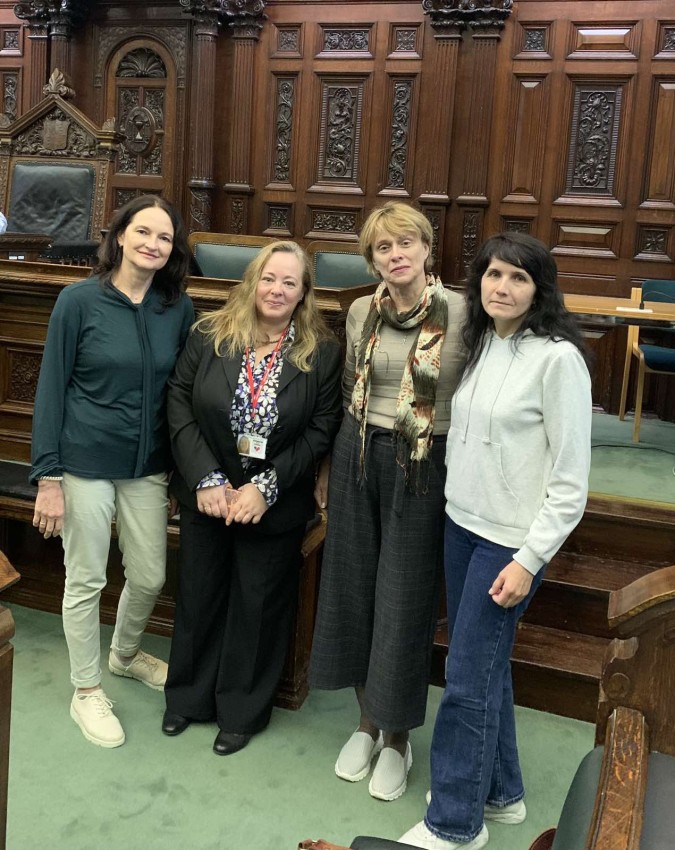
The educational visit to Aston University contributed to the development of methodical and pedagogical competences of the participants, expanded the possibilities of intercultural communication in the academic environment and inspired the further dissemination of the results of the MultiEd project.
September 22, 2023. Erasmus Office of Ukraine conducted a monitoring cluster event under the EU Erasmus+ Program with the aim of spreading leading experience and monitoring the results of projects in the direction of Higher education potential development, ensuring synergy between projects working in a certain cluster, promoting the thematic priorities of the EU Erasmus+ Program, in particular quality, digitalization, inclusion and environmentalization of higher education.
Svitlana Shitikova, coordinator of the National Erasmus+ office in Ukraine, and representatives of the Ministry of Education and Science of Ukraine addressed the participants of the event with a welcome speech, who emphasized the importance of the participation of Ukrainian universities in KA2 Erasmus projects and noted the special qualities of Ukrainian project participants, their focus on quality achievement results, despite the difficult conditions of martial law in the country.
The webinar "Quality assurance in the context of European integration: recognition, digitalization, inclusion" covered projects by cluster of modernization of educational programs, one of which is the MultiEd project, "Development of the potential of foreign language teacher training on Ukraine's path to multilingual education and European integration" (610427- EPP-1-2019-1-EE-EPPKA2-CBHE-JP-MultiEd “Foreign Language Teacher Training Capacity Development as a Way to Ukraine's Multilingual Education and European Integration” which is coming to an end this year.
The results of the project were presented by the national coordinator Svitlana Zapolsky, associate professor of the Zaporizhia National University. She listed the achievements of the project, which include the updating of educational programs for foreign language teachers 014.02 Secondary Education in 8 Ukrainian universities, the joint development of 9 new courses and the updating of at least 14 courses in each university, 2 developed manuals, an autonomous electronic course, multilingual education strategies and national recommendations on multilingualism in higher education of Ukraine.
The coordinator emphasized the close cooperation between Ukrainian and European colleagues during the implementation of the project and thanked the European colleagues for their professional support and provided expertise.
All the results of the project implementation will have a significant impact at the national and institutional levels in accordance with the strategic development of higher education in Ukraine in the context of European integration.
MultiEd quality control
August 16-19, 2023 on the basis of the Ternopil National Pedagogical University named after A meeting of the commission for internal quality control of the MultiEd project was held in Hnatyuk. The meeting was attended by 9 partner universities of the project, representatives of TESOL and MES. The meeting was attended by the project manager Assoc. M. Yu. Shkuropat. The participants of the meeting analyzed the quality of execution of the work packages, reviewed the previous reports of those responsible for the work packages and divided into working groups to prepare the required reporting. During four days, working groups worked intensively on reports, collected and uploaded documents with the results of the project's tasks (updated educational programs, work programs of new and updated courses, approved multilingual education strategies, etc.) to a common box.
On August 17, the meeting was attended online by Svitlana Shitikova, head of the Erasmus + office in Ukraine. She familiarized herself with the results of the project, listened to the impressions of team representatives participating in the project, and asked about the impact of the project on building the educational capacity of partner universities. All universities noted the significant impact of the project on the quality of educational components and the level of mastery of foreign languages. The participants also noted positive feedback from stakeholders, reviewers of new and updated training courses.
On August 18, online inclusions took place with foreign partner universities - representatives of Aston University (Great Britain), University of Tartu (Estonia) and Heidelberg University of Education (Germany). The foreign partners heard information about the implementation of the work packages they managed, expressed their admiration for the work of the project teams of Ukrainian universities and wished for the successful completion of the project and the quality preparation of the report.
MultiEd seminars "Multilingual education in Europe and Ukraine" (June 2023)
During three weeks of June 2023, within the framework of the Erasmus+ project "Development of the potential of teachers of foreign languages as a path to multilingual education and European integration of Ukraine / MultiEd", a large-scale event was held to disseminate the results of the project, which consisted of a series of seminars that were combined into four main topics: "Development of educational programs and formation of general and professional skills and competencies of graduates", "Subject-language integrated education in Ukraine: challenges and prospects", "Blended education and practice of continuous education in European countries", "Multilingual education in Europe and Ukraine". In total, the project team conducted 36 master classes for educators from all over the country as part of these seminars.
The members of the project team, associate professor Roman Mykolayovych Sytniak, associate professor Lyudmila Volodymyrivna Kokorina, associate professor Olena Anatolyivna Yasinetska, associate professor Victoria Volodymyrivna Kontsur, presented the GIIIM with dignity.
Associate Professor of the Department of National and Foreign History Kontsur V. V. during the master classes "CLIL and online tools for studying history" introduced the participants to the possibilities of studying history and country studies material using the subject-language integration teaching method. Students had the opportunity to complete exercises in English for the History and Culture of Ukraine course, as well as get acquainted with online resources that allow using the CLIL methodology in history classes.
Associate Professor of English Philology and Translation O. A. Yasinetska for teachers of educational institutions of Ukraine held three webinars on "Fundamentals of academic writing (English)" in the context of blended learning practices. Assoc. O. A. Yasinetska provided the author's vision of the algorithm for acquiring knowledge and forming written communication skills at the level of an independent, conscious user of the English language (average level B1) in three modules: linguistic and stylistic characteristics of academic texts and the concept of academic integrity; types and structural and stylistic features of academic texts; basics of professional writing.
In an active and creative atmosphere, master classes "Blended learning as effective entertainment and active participation" were held under the leadership of an associate professor of the Department of Germanic Languages Sytnyaka R. M. It considered several models of effective combination of classical classroom learning with learning using the latest online platforms and resources, assessed the effectiveness of blended learning for the current situation with the education system in Ukraine. More than 30 teachers from various educational institutions of Ukraine attended the webinar.
Head of the Department of Pedagogy and Teaching Methods, Associate Professor Kokorina L. V. conducted three master classes "Profile of the teacher in the context of national standards of higher education" on the features of the profile of the teacher taking into account the latest trends in the training of foreign language teachers and current regulatory documents.
It is pleasant to note the attention and interest of the participants of all webinars, the atmosphere of constructive cooperation in ensuring the quality and efficiency of education. We are grateful to the trainers for their professional preparation and presentation of the material, and to the participants for their interest and active participation. The number of listeners and their warm feedback indicate the timeliness and relevance of the topic.
We wish victory and peace to Ukraine, and to each of us - always safety, strength, success, fulfillment of dreams!
Improving the qualifications of scientific and pedagogical workers on the CLIL Methodology course
From May 15 to June 30, 2023, as part of the partnership academic mobility between GIIIM and KhNU named after In Karazina, the qualification of scientific and pedagogical workers of both universities was improved. The teachers of GIIIM were trained on the Moodle platform of the KhNU, and the teachers of the KhNU, in turn, on the Moodle platform of the GIIIM.
The e-course "CLIL Methodology" was created to fulfill the tasks of the MultiEd project in collaboration with representatives of project teams from 9 Ukrainian universities under the leadership of European partners and is presented on the Moodle platform in the most convenient format so that participants can comfortably study the material in their free time. Most participants who completed the course wrote about their impressions and expressed admiration for the quality of the content.
Feedback from participants
Ihor Rubtsov, KhNU named after Karazin: "Thank you for the unique CLIL course experience! It was an incredibly valuable and exciting course that broadened my knowledge and skills. In the future, I will gladly take part in other courses, if you can provide such an opportunity."
Svitlana Tarasova, KhNU named after Karazin: "Really interesting and useful course that teaches modern methodology of teaching foreign languages"
Anastasia Vakulenko, KhNU named after Karazin: "The course is not easy to pass, rather it is one that challenges and tests professionalism. This makes it even more interesting. Thank you for the opportunity to study advanced European experience in teaching foreign languages."
Those who successfully completed the course received certificates from the Educational and Scientific Center of Modern Technologies of Formation of Professional Competence of the State Institute of Medical Education according to the established model.
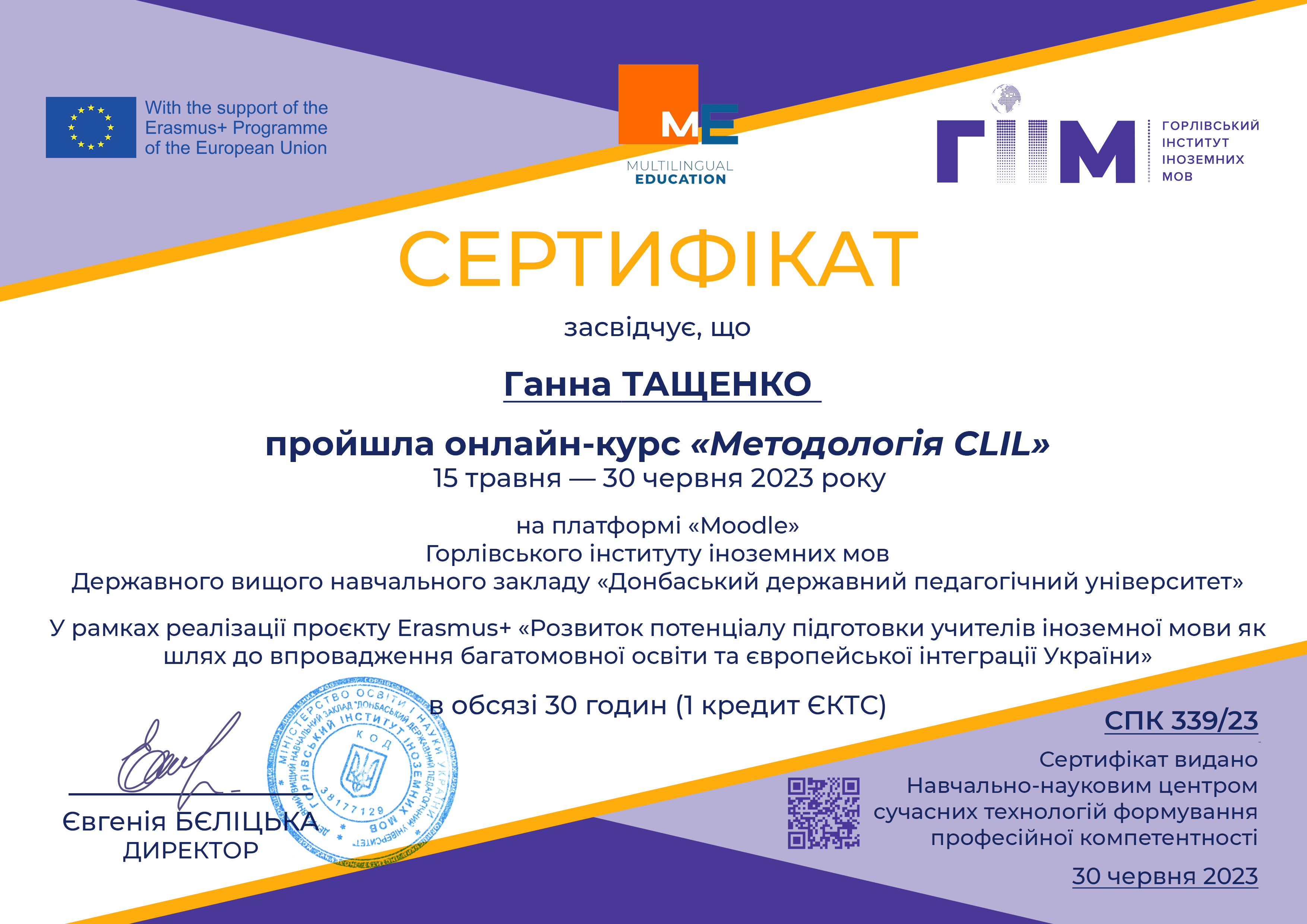
Final meeting of project managers 06/16/2023
The final meeting of MultiEd project managers was held. The partners responsible for the work packages of the project reported on the completion of the actions of the work packages (WP 2-5 Development), defined the scope of work for the successful completion of the tasks of the work package WP6 - Quality. Project partners from Aston University (Birmingham, Great Britain) confirmed their readiness to meet a delegation of guests from Ukrainian universities participating in the project in October 2023.

International webinar "Sharing EU multilingual education policymaking practices in Ukraine"
On May 3, 2023, the international webinar "Sharing EU multilingual education policymaking practices in Ukraine" took place (within the implementation of the Erasmus+ KA2 "MultiEd" project).
The speakers were Kristina Kallas (Minister of Education of Estonia), Maryna Mruga (state expert of the Ministry of Education and Culture of Ukraine), Iryna Zadorozhna (vice-rector for scientific work and international cooperation of the Ternopil National Pedagogical University).
The webinar was moderated by the coordinator of the "MultiEd" project, O. Golovko (Ph.D., University of Tartu).
The teachers of GIIIM were lucky to take part in the current webinar on the exchange of practices of EU multilingual education policy in Ukraine.
The Estonian Minister of Education and Science Kristina Kallas (PhD) analyzed Estonia's experience in multilingual education. State expert of the Ministry of Education and Culture of Ukraine, Maryna Mruga, focused attention on the challenges facing Ukraine in the process of introducing multilingual education. The vice-rector for scientific work and international cooperation of Ternopil National Pedagogical University named after Volodymyr Hnatyuk Iryna Zadorozhna (Doctor of Pedagogical Sciences, Professor) highlighted the results of the study of the language situation in Ukrainian universities in 2020-2021, the experience of introducing new courses and updating previous ones in partnership with European colleagues , the results of using the newly created e-course "CLIL Methodology" on the "Moodle" platform for professional development for teachers and lecturers, and announced the continuation of the piloting of this course on the "Moodle" platforms of Ukrainian partner universities. The speaker also outlined the directions of the Multilingual Education Strategy of Ternopil National Pedagogical University named after Volodymyr Hnatyuk and the main provisions of the National Recommendations for the Development of Multilingual Higher Education in Ukraine. We are grateful for the moderation of the event to the coordinator of the "MultiEd" project, Oleksandra Golovko (Ph.D., University of Tartu).
Important issues were discussed, a constructive discussion took place. We are deeply grateful to the organizers and speakers.
Study visit "Estonia as an educational nation" (from May 22 to 26, 2023)
Teachers of Horliv Institute of Foreign Languages, prof. S. A. Komarov, associate professors V. G. Marakhovska, I. O. Sklyar, as part of participation in the project "Development of the potential of foreign language teachers as a way to multilingual education and European integration of Ukraine / MultiEd» for educational purposes they visited Tallinn, Tartu, Narva (Estonia).
A rich program of the visit "Estonia as an educational nation" gave the opportunity to visit educational institutions of various educational levels in Estonia, to get to know in detail the implementation of the "language immersion" method at its various stages. Thus, at Miina Härma Gymnasium (Tartu) our colleagues got acquainted with approaches and strategies of language learning, with educational technologies for improving speech (Tallinn). A lively discussion took place with the directors of Narva College and Narva State Gymnasium (Narva) on the implementation of strategic vision and challenges in secondary schools in Estonia, teacher training: what schools expect from universities, etc. The program "Establishment of international relations and strategy of internationalization of higher education" etc. was presented at the Academy of Security Sciences (Tallinn).
Project participants attended the lectures of Heidelberg University professor Hans-Werner Henuke "Improving education: tandem language learning", Peter Mehisto, honorary researcher of the Institute of Education, University College London, Oleksandra Golovko "Education of cultural heritage in foreign languages" (University of Tartu), Yulle Kesli, senior specialist in continuing education "Lifelong learning and e-learning at the University of Tartu" and others. On the other hand, teachers of GIIIM spoke about the peculiarities of studying at a Ukrainian university, shared their experience of teaching philological disciplines.
We wish our colleagues scientific and creative success in implementing the acquired experience!
Internal monitoring of the quality of project implementation (December 2022)
As part of the implementation of the Erasmus+ KA2 "MultiEd" project, a three-day quality control of the project implementation took place on the basis of TNPU. Oleksandra Golovko, project coordinator from the University of Tartu (Estonia), visited TNPU. On the first day, attention was focused on piloting the e-course for teachers "CLIL Methodology", which is located on the "Moodle" platform of TNPU. An online meeting was also held with all project partners to share results and develop further strategies.
The second day of quality control of the implementation of the Erasmus+ KA2 "MultiEd" project was devoted to the consideration of parameters that reflect the quality of project activities: feedback on new training courses, feedback on updated training courses, indicators of the level of foreign language proficiency at the beginning and end of the academic year, feedback from stakeholders ( primarily students), final monitoring of the quality of project implementation in universities. An online meeting was held with all partners, during which the forms and terms of quality control activities were discussed.
On the third day of quality control of the implementation of the Erasmus+ KA2 "MultiEd" project, multilingual education strategies for higher education institutions of Ukraine and National recommendations for multilingual higher education, developed by project participants, were reviewed and discussed with partner universities. The teachers of the department of English philology and methods of teaching English analyzed the results of the introduction of new and updated training courses.

CLIL at Work – internship at Heidelberg University (November 2022)
The teachers of GIIIM - associate professor of the department of pedagogy and teaching methods Lyudmila Kokorina, senior teacher of the department of English philology and translation Olena Koroleva, associate professor of the department of domestic and foreign history Viktoriya Kontsur - took part in an international internship on the methodology of subject-language integrated education within the framework of the Erasmus+ project "Foreign Language Teacher Training Capacity Development as a Way that Ukraine's Multilingual Education and European Integration". The study visit lasted a week from November 7 to 11, 2022 at the Heidelberg University of Education (Germany).
The goal of the internship was to improve and further implement CLIL methods in Ukrainian education. The events were well balanced and combined theoretical, practical and cultural components. Project participants listened to lectures and took part in seminars on multilingual education, features of the teacher education system in Germany, approaches to critical learning and methods of physically active teaching in higher education. The practical component included a preliminary discussion, analysis of plans and attendance at training classes conducted by university students using CLIL, pedagogical observation, as well as further discussion of the results of the lessons with the participation of methodologists and students.
The meeting of the internship participants with Ukrainian schoolchildren who found refuge in Germany was touching. Teachers attended German lessons adapted for Ukrainian high school students. The highlight of the internship was a series of excursions to the historical part of Heidelberg, one of which was prepared by students of the secondary school named after Theodor Heuss Realschule.
The third summer school of the MultiEd project
At the end of the summer, from August 22 to 27, Yasinetska Olena Anatolyivna, associate professor of the Department of English Philology and Translation, Faculty of Social and Linguistic Communication of the Horliv Institute of Foreign Languages, was in Estonia (at the Narva College of the University of Tartu) with colleagues from Ukrainian higher education institutions as part of the international of the Erasmus+ CBHEMultiEd project. The cooperation concerned the development of interactive tests of the CLIL Methodology course, which involves subject-language integrated learning - Content and Language Integrated Learning. Each member of the working group developed tests for a specific module on the Moodle platform (Moodle - Modular Object-Oriented Dynamic Learning Environment - modular object-oriented dynamic learning environment) for further testing and implementation of the course in the educational process. It is useful that international projects promote the exchange of ideas, experience, and the latest developments. It is interesting when cooperation provides an opportunity to visit other countries for a direct feeling of support and familiarization with the culture, traditions and professional life of colleagues abroad. It is important when friendly acquaintances are formed and an atmosphere of mutual assistance is felt. It is pleasant when you return to Ukraine, where the achievements of international cooperation can be favorable, meaningful, interesting and useful for the development and improvement of education in our country. So may all of us and everyone be lucky in all good and important things!
The second summer school of the MultiEd project "Multilingualism and beyond"
The second summer school "Multilingualism and beyond" under the Erasmus+ MultiEd project, held at the University of Tartu, Estonia, has ended. Representatives of partner Ukrainian universities from Kharkiv, Poltava, Cherkasy, Zaporizhzhia, Ternopil, and Ivano-Frankivsk took part in the school. Horliv Institute of Foreign Languages was presented by the project manager, assistant professor of the Department of English Philology and Translation Shkuropat M.Yu. The school program included the study of the concepts of multilingualism and multiculturalism, types of bilingualism and multilingualism, phenomena: language contact, linguistic capital, linguistic landscape, receptive multilingualism, language awareness and language ideology. The participants listened to lectures by specialists in multilingualism, in particular the professor of Tallinn University Anna Vershik, carried out research, took part in discussions, and gave presentations. The result of the ten-day training was the development of multilingual education strategies for each Ukrainian partner university and national recommendations for the development of multilingual higher education in Ukraine. The strategy of multilingual education of the GIIIM will be presented for discussion to the scientific and pedagogical team - for familiarization, feedback, clarifications and the development of specific actions regarding its implementation. After that, the strategy will be approved by the Academic Council of the State Institute of Medical Sciences for the purpose of its further implementation. Implementation of the strategy will primarily involve strengthening the role of the Ukrainian language in the educational process and outside it, all kinds of promotion of the English language as a language of learning, career building and intercultural communication, as well as supporting the study of other European languages.
The first summer school of the MultiEd project "Yurii Lotman and semiotics of culture: culture, text, translation, new media, cultural memory, semiosphere"
From July 5 to 15, 2022, the first summer school of the Erasmus+ MultiEd project "Yuri Lotman and cultural semiotics: culture, text, translation, new media, cultural memory, semiosphere" was held at the University of Tartu (Estonia). Horliv Institute of Foreign Languages was represented by Lyudmila Suhovetska, associate professor of the Department of Germanic Philology.
This trip took place within the framework of the implementation of the European Union Erasmus+ KA2 program "Development of the potential of training foreign language teachers as a way to introduce multilingual education and European integration of Ukraine / MultiEd".
During their studies, participants from the universities of Poltava, Zaporizhzhia, Cherkassy, Ivano-Frankivsk, Ternopil, Bakhmut (Dnipro) attended lectures and seminars by teachers of the Department of Semiotics of the University of Tartu, where they discussed current issues of modern science: the development of Yuri Lotman's ideas of culture semiotics, cultural memory and modern culture, semiotics of space and city, semiotics of translation, transmediality in culture, digital semiosphere, ecosemiotics. The educational program was organically combined with a diverse cultural program, which included visits to museums (art museum of the University of Tartu, Estonian National Museum, research interactive museum), a quest-excursion along Lotman's paths, viewing a documentary film about the life and work of Y. Lotman, participation in a master- notebook-making classes in the premises of an old printing house, a trip on an old boat.
The practical part of the internship was the preparation of a methodological manual using the subject-language integrated learning (CLIL) method for the course "Language, culture, society" based on the syllabus developed within the framework of the Erasmus+ KA2 "MultiEd" project. Meetings of the working group involved discussion of the structure of the publication and its content.
The organization of the trip took place on the initiative and with the support of the project managers of the Narva College of the University of Tartu (Estonia) Oleksandra Golovko and Christian Klauks, as well as the head of the international cooperation department of the institute Maryna Shkuropat.
In order to spread the results of the "MultiEd" project and the Internationalization Strategy of the State Technical University of the Russian Academy of Sciences "DDPU", trainee Lyudmila Suhovetska will hold open events for teachers and the administration of the University, during which she will present the results of her visit to Estonia.
Webinar "Challenges to the implementation of existing Erasmus + projects: Capacity building of higher education and other cooperation projects during martial law in Ukraine"
On June 2, 2022, a webinar was held by NEO Ukraine together with the Ministry of Education and Science of Ukraine "Challenges to the implementation of existing Erasmus + projects: Capacity building of higher education and other cooperation projects for martial law in Ukraine", attended by #MultiEd and #WARN from the Horlivka Institute of Foreign Languages. The event was attended by about 80 members of the teams of existing Erasmus + projects, as well as coordinators from EACEA - the European Executive Agency for Education and Culture, which oversees all Erasmus + projects.
At the beginning of the meeting, it was emphasized that, despite the martial law, the Government of Ukraine, including the Ministry of Education and Science, has identified the implementation of international obligations as a priority.
The head of the National Erasmus + Office of Ukraine Svitlana Shitikova sincerely congratulated all participants of the webinar, expressed awareness of the situation of some Ukrainian universities due to Russian aggression, temporary occupation of certain territories, destruction of infrastructure, internal relocation and loss of equipment and project documentation. All these risks, of course, are detrimental to the timely implementation of commitments and are officially recognized as force majeure, which will be taken into account when considering the suspension or extension of the deadline for submission of final results of projects.
Svitlana Shitikova thanked the teams for their work and assured NEO Ukraine of its readiness to provide consulting support to designers 24/7. In her presentation, the leader outlined the challenges faced by Ukrainian universities and elaborated on ways to address them together with NEO Ukraine.
We believe in Ukraine, every citizen, the Armed Forces of Ukraine, partners and work together for the result to win! Everything is and will be Ukraine!
Choice of CLIL courses
The procedure for selecting academic disciplines (ICE) for the 2022-2023 academic year has started at the GIIM. Applicants make their choice using a special program in online format. Teachers, members of the Erasmus + MultiEd project team, held an online meeting with applicants to talk about the project objectives, familiarize themselves with the CLIL methodology and offer English-language electives updated during the project based on the CLIL methodology. Assoc. Arkhipova IM told about the benefits of subject-language integrated learning of foreign languages. Other participants of the meeting, among whom were Assoc. Shkuropat M.Yu., docent Kokorina LV, Assoc. Prof. Kontsur VV, Assoc. Yasynetska OV, docent Pozhidayeva NP, docent Sytnyak RM, advertised their disciplines, which are offered to applicants from the next school year. We are confident that the application of proven modern methodology will bring the level of teaching and mastering English in GIIM to a new level.
Erasmus flash mob in Ukraine.
? EU Erasmus + program turns 35 in 2022!
The Horlivka Institute of Foreign Languages is proud to have joined the Erasmus + movement in 2019 by participating in two KA2 projects at once: #WARN "Academic Counteraction to Hybrid Threats" (institutional project manager Prof. Halyna Dokashenko) and #MultiEd as Language Training Teachers the way to the introduction of multilingual education and European integration of Ukraine "(institutional project manager Assoc. Prof. Maryna Shkuropat).
✍️ Thanks to the Erasmus + program, we have felt part of the single European educational space, we have begun to breathe the same air of innovation in education that European colleagues breathe. We realized that we desperately needed to study best academic experience in institutional and methodological terms, but there is much we can share with our colleagues: completely different conditions than those familiar to European universities.
Unfortunately, at first the pandemic, and now the military aggression, fully intervened in the well-planned course of our projects, but we are convinced that even in such conditions, the dedication and professionalism of our teams will achieve maximum results.
? We are grateful #ErasmusPlus #ErasmusUA for the possibility of professional development, outlining prospects, expanding horizons;
- #NEO_Ukraine and @Svitlana_Shytikova for supporting and encouraging further Erasmus + activities;
- European project partners #MultiEd and #WARN for high professionalism and sincerity;
- colleagues and friends from the teams of Ukrainian partner universities #MultiEd and #WARN for creative collaboration, support and endurance.
We believe in ourselves and the Armed Forces of Ukraine, we hope for the support of the forces of good from around the world!
Everything will be Ukraine! ??
Results of the survey on the language situation in the DSPU (WP 5.4., April 2022)

- As part of the work package 5.4. the results of two waves of the poll on the language situation at the DSPU were summed up.
- In the first wave of the survey (2020) 448 students and staff of GIIM took part, the second stage was joined by students and staff of DSPU. The total number of respondents was 998, including 730 bachelors (73%), 70 masters (7%), 36 graduate students (4%), 137 NPP (14 %) and 25 administrative staff (3%).
- Analysis of the obtained data showed the following results:
- 48% respondents stated in their answers that their native language is presented in two languages: Ukrainian and Russian. For 41% respondents Russian is their native language. Ukrainian is the native language of 10% respondents.
- 76.5% respondents speak Ukrainian fluently. 20.8% respondents understand, communicate, write in Ukrainian; understand and communicate a little 2,1%; understand but do not speak 0,5%, do not know the language 0% respondents.
- 91.2% respondents are fluent in Russian. Understand, communicate, write in Russian 8,5% respondents; understand and communicate a little 0.1%; understand but do not speak 0,09%; do not know the language 0% respondents.
- Fluent in English 7.9% respondents. Understand, communicate, write in English 25,2% respondents; understand and communicate a little 45,2%; understand but do not say 15,1%; do not know the language of 6.7% respondents.
- 84% respondents noted that they always use Ukrainian as the language of instruction.
- For informal communication between students, respondents always use (51%) Russian.
- According to the respondents, the university administration always uses the Ukrainian language (88%) for official communication.
- 49% respondents always communicate in Ukrainian between students and university staff.
- 58% respondents noted that university staff always speak Ukrainian to each other.
- Ukrainian is used to write term papers, 90% respondents said. To write master's theses always use the Ukrainian language - 98%, English - 13% (abstract).
- According to the respondents, Ukrainian is also used in research projects (92%) and 30% is also used in English.
- The Ukrainian language 90% is always used for publications. English is used - 30% respondents.
- 74% respondents always use Russian for daily communication outside the university, 17% respondents always use Ukrainian in communication outside the university.
- Respondents always receive information and news from the media and social media in 51% in Russian and 43% in Ukrainian. Only 13% respondents receive English.
- To get a career in Ukraine, respondents will need knowledge at the highest level in the following languages: Ukrainian (82%), English (62%), Russian (36%).
- Respondents stated that in order to study / work, they need to know Ukrainian (67%), English (44%), and Russian (36%) at the highest level.
- 3% respondents indicated that they have an international certificate certifying the level of English language proficiency. The rest - there is no such certificate (97%).
- When asked why you study English, respondents said: to communicate freely - 61%; to read and understand text - 56%; to travel freely - 54%; to write clearly - 38%; to learn about other countries and cultures - 32%.
- 73% respondents fully agree with the statement "Multilingualism enriches society, so it needs to be promoted in Ukraine."
- 65% respondents noted that more attention should be paid to teaching English.
- Respondents believe that if some subjects (except languages) were taught in English at school / university, the horizons of further education would be expanded (69%); English language skills (66%) would be improved.
The Presentation of the project results can be found at: http://edu.forlan.org.ua/doc/EC/P9_HIFL_Презентація%20результатів%20дослідження%20про%20мовну%20ситуацію%20в%20ДДПУ-2.pdf
19.11.21 WORKING MEETING OF REPRESENTATIVES OF THE WORKING GROUPS OF THE PROJECT WITH REPRESENTATIVES OF THE MES ON COORDINATION OF ACTIONS ON THE DEVELOPMENT OF A STRATEGY FOR A MULTI-LANGUAGE BASIS.
The meeting was attended by Maryna Mruga, a state expert of the Directorate of Professional Higher Education of the Main Department of Higher and Adult Education of the Ministry of Education and Science of Ukraine.
At the beginning of the meeting, the general manager of the project Oleksandra Golovko (University of Tartu, Estonia) reminded the audience of the idea outlined in the project objectives. The idea is to develop a draft strategy for multilingual education by Ukrainian partner universities. The first step towards the implementation of this idea is to study the attitude to multilingual education in different regions of Ukraine through conducting and analyzing a survey on the language situation. A recent study visit to Estonia as part of the project aimed, inter alia, to study the country's successful experience in implementing multilingual education. The participants of the visit learned that the key to the success of multilingual education in Estonia was the use of the language immersion methodology introduced by the State Center for Language Studies after learning from the Canadian experience and developing its own language immersion methodology with the support of the state program. As a result of the successful implementation of this program in Estonia, it has become the norm to conduct education at three levels (preschool, school and higher) in three languages: official, English and the language of the country bordering Estonia or native to the majority of the region.
Marina Mruga spoke about the positive attitude of the Ministry of Education and Science towards multilingual education, but stressed that the Ministry of Education and Science considers only English as the main language of interethnic communication in Europe and the world. The representative of the Ministry of Education and Science acquainted the participants of the meeting with The concept of English language development in universities by 2025, developed and approved by the ministry. The purpose of state policy on the development of English in higher education in Ukraine is to create opportunities for cultural, educational and professional development and prosperity of every citizen, promote integration and economic growth of higher education institutions, improve the quality of educational services in higher education in Ukraine. global aspirations of Ukraine and its economic growth. A key point in supporting this idea is to encourage higher education institutions to teach professional disciplines in English. In order to maintain the level of language proficiency, constant practice is required. The university is the only place where a student can immerse himself in the English-speaking environment thanks to such programs.
The participants of the meeting shared their views on the outlined problem, made proposals to explore the possibilities of combining efforts of universities and the Ministry of Education and Science in the field of multilingual education and to find common ground between the project and the relevant department of the Ministry of Education and Science.
25-29.10.2021. International internship in Estonia, Placement for CLIL Internship (WP3.11)
From October 25 to 29, 2021, the long-awaited event of the project took place Internship placement in Estonia, which was postponed from October 2020 due to COVID-19 quarantine restrictions.
Two participants from each Ukrainian project partner and representatives of the Ministry of Education and Science of Ukraine took part in this internship. GIIM was represented by members of the project team Assoc. Shkuropat M.Yu. and Assoc. Sitnyak RM All participants in the study visit were fully vaccinated, had digital vaccination certificates, and strictly adhered to the mask regime, restrictions, and social distancing. The visit took place in three cities in Estonia: Tallinn, Tartu and Narva. The internship program was very intensive and included study visits to primary, secondary and higher education institutions, round tables, participation in a scientific conference and a number of cultural events.
Day 1. 25.10.2021. The program was opened by a round table at the Center for Language Immersion at the Estonian Language House in Tallinn, which has been operating since 1998. The director of the center, Irena Käosaar, acquainted the guests with the concept of the Estonian language policy and the strategy for the implementation of multilingualism, which has been in force in Estonia since 2000. The concept was based on the experience of Canadian colleagues from Toronto and the Department of Education of Finland.
According to this concept, the Center has developed three types of school programs "immersion" in the state Estonian language for those who do not speak it: "early immersion" (grades 1 to 9), "late immersion" (grades 6 to 9) and "Bilateral immersion". Similar programs have been developed separately for kindergartens, where "full immersion" is provided from 5 years, ie full transition to Estonian in groups of Russian-speaking children, partial immersion - from 3-4 years: with the preservation of 50% activities in the native (Russian) language, and bilateral immersion - in bilingual groups, where there are children from both Estonian and Russian-speaking families.
During the round table, the director of the center spoke about the success of the implementation of the state language concept and answered numerous questions from guests. In particular, the guests learned that in order to implement this state program, a network of "language immersion" schools was created in Russian-speaking regions and a special qualification was opened in the university's Estonian language teacher training program - "language immersion class teacher". The implementation of this program resulted in a significant increase in the number of children learning the state language in Russian-speaking regions, increased interest of parents and children in learning the state language and, accordingly, a significant improvement in the state language in Russian-speaking regions.
The next event of the day was a visit to the Tallinn Gymnasium Pae Gümnaasium, which specializes in the implementation of CLIL methodology (foreign language subject teaching) and the method of "language immersion", and acquaintance with the teaching staff led by director Isabella Riitsaar. During the round table and communication with Estonian colleagues, many issues of multilingual education were discussed. The guests were told about the principles of language immersion, including: one teacher - one language (ie, during the lesson the teacher can not use any language other than the target); intensive training - up to 10 hours a week, "talking walls" (constantly updated thematic clarity - tips on the walls of the classroom); group forms of work; thematic planning for most subjects; language activity of student and teacher 80/20; active teaching methods; not to be afraid of mistakes; to develop the native language in parallel (from the 5th grade the number of subjects in Estonian and Russian - 50% to 50%). The guests were shown what amazing results in Estonian and English can be achieved by using the principles of the language immersion program.
The day ended at the Museum of Science and Energy, where guests from Ukraine were shown the training program "Sky Lights" and given the opportunity to participate in interesting experiments. Then the Ukrainian delegation moved by train to the city of Tartu.
Day 2. 26.10.2021. The day in Tartu began with a tour of the library of the University of Tartu photos near the sculptural composition in honor of the prominent philologist, founder of the Tartu School of Semiotics Yu.M. Lotman. Then there was a tour of the university, where guests learned about the history of this famous institution, its traditions, present and plans for the future. Ukrainians were surprised by the museum room in the attic, which in the 19th century, as it turned out, served as a dungeon for violators of the university's code of conduct.
Then there was a visit to the Alexander Pushkin Tartu School, where the principal Alina Braziulene not only held a round table and talked about how the programs of partial and full immersion in the language of her school, but also together with the headmaster conducted a master class in Estonian for Ukrainian colleagues. The guests were convinced of the possibility of learning a foreign language without using the native language through a number of organized activities that were aimed at repeating the target speech models.
After that, the delegation from Ukraine was expected at the Center for International Affairs of the University of Tartu, where the international work manager Egle Rummel da Costa spoke about the peculiarities of the MultiEd project and preparation of reporting documents, because the University of Tartu is the grantee of this project.
The second day of the trip ended with a visit to the Museum of Finno-Ugric and Northern Languages, which impressed with its unusual design and interesting technological solutions.
After the museum, the guests took a shuttle bus to Narva.
Day 3. 27.10.2021. The first day in Narva began with a visit to the kindergarten Tareke (Tower). The guests were greeted by the director Jelena Konovalova in the Estonian national costume, she spoke about the success of the teaching staff in promoting the Estonian language in the Russian-speaking region. The principal took the guests to the kindergarten and offered to attend two classes with children aged 4-6 - in Estonian and music in Estonian - in the group of partial language immersion (regime moments are held in the native language, and classes - in the state Estonian). In practice, the guests saw the benefits of learning the language through practical activities, were convinced of the success of the principles of language immersion programs and shared their impressions with the teaching staff. The hosts and guests exchanged views on the benefits and challenges of working on a language immersion program. The conversation took place in an extremely friendly atmosphere and ended with the exchange of gifts.
After that, the guests from Ukraine were shown the newly rebuilt dormitory of Narva College, which has the title "House of the Year 2020". The dormitory attracts with its impressive design, has its own swimming pool, state-of-the-art furniture and equipment of private and public rooms.
Then the guests were given a tour of Narva College, University of Tartu. The guide was Denis Larchenko, the college's curriculum manager. He spoke about the existing educational programs and specializations and prospects for their expansion due to the demand from foreign students, in particular from China and Russia. Denis Larchenko paid special attention to the development of student entrepreneurship, when students start paid services for the local population, in particular to teach students the basics of programming and digital technologies.
Narva College hosted a seminar for guests to exchange experiences on "Training programs for future teachers at Narva College and retraining and internships for teachers in the city." The seminar was conducted by Piret Kärtner, Director of Training at Narva College.
Days 4-5. 28-29.10.2021. Conference "Trends and Issues in CLIL and ELT". On the fourth and fifth days, the Ukrainian delegation took part in the international scientific conference “Trends and Issues in CLIL and ELT” at Narva College. The conference was held partly in the classroom, partly in the online format. The reports of the scientists were devoted to the topic of teaching various aspects of foreign languages in the context of distance learning; use of digital technologies; comparison of practices of using content-integrated learning in European countries, in particular in Germany, England, Spain, Estonia; problems of inclusive pedagogy; use of free resources in English in distance learning.
The study visit ended with an excursion to the Narva Fortress, which had important historical significance as a border in the history of Estonia.
Thus, the participants of the international internship in Estonia got acquainted with modern language teaching methodologies and principles of multilingual education, which are effectively used in Estonia, gained understanding of CLIL methodology in multilingual learning, learned the experience of teaching different aspects of foreign languages in distance learning. All participants received the appropriate certificates.
12.10.21 WORKING MEETING ON THE ANALYSIS OF THE RESULTS OF THE SECOND STAGE OF THE SURVEY OF THE LANGUAGE SITUATION IN DDPU.
The national coordinator of the ZPU project invited a sociology specialist who explained the principles of conducting a sociological survey analysis to obtain valid results.
Following the meeting, it was agreed that the consultant will create video guidelines for the analysis of survey data.
12.10.21 PROJECT QUALITY ASSURANCE BOARD MEETING (WP 6)
The meeting was attended by the project manager from GIIM Assoc. Shkuropat M.Yu. The following questions were heard:
1. Report on the evaluation of the meeting of project managers.
Iryna Zadorozhna (P11) reported on the preparation of a report evaluating the results of the survey (September 8, 2021) The results of the survey are generally positive, the suggestions of the respondents are taken into account
2. Analysis of feedback from stakeholders (stakeholders).
Iryna Zadorozhna (P11) reported that part of the stakeholder feedback on the updated curricula from the partner universities that started their piloting had been received and stressed the need to receive stakeholder feedback after the curriculum update from all partner universities. Stakeholder feedback should be downloaded as soon as the curriculum is updated. Each university can use its own approach to curriculum monitoring.
3. Assessment and control of language skills progress.
Iryna Zadorozhna (P11) said that the TNPU (P11) team analyzed the possibilities of using DIALANG tests to assess and monitor language progress within the MultiEd project. The test complies with European guidelines for language education, contains 5 sections with 30 questions. It takes 2 hours to complete. To identify the dynamics of changes, testing should be conducted at the beginning and end of the academic year (at the beginning and end of the 2nd semester for the 2021-2022 academic year). In addition, c-tests can be developed with an emphasis on new and updated subjects.
The participants agreed that the DIALANG test demonstrates reliable results for the project, and decided that the development of additional c-tests is not necessary, as each new and updated course will include final tests.
4. Questionnaire of responses to the CLIL e-course.
Iryna Zadorozhna (P11) said that before the meeting, all partners were sent a questionnaire developed by the P11 team to evaluate the e-course, and asked for suggestions from partners. The participants discussed the approach to maintaining the anonymity of the results, suggested adding a list of possible answers to the position on strengths, replacing the words "I completely disagree" with "disagree".
The P11 team will prepare the final version of the E-Course Feedback Questionnaire and place it in Dropbox.
8.10.21 WORKING MEETING ON THE PURCHASE OF ADDITIONAL EQUIPMENT.
At present, all equipment purchased under the project has been received by Ukrainian partner universities. The National Coordinator, who dealt with the purchase of equipment, explained that it was possible to allocate funds for the purchase of additional equipment through savings as a result of previous tenders. Decided: each Ukrainian partner must decide on the list of required equipment, fill out a Google document so that the grantee has the opportunity to agree on the possibility of procurement with the grantor.
8.09.2021 GENERAL MEETING OF PROJECT MANAGERS
All members of the project groups of the partner universities were invited to the general meeting of MultiEd project managers. The purpose of the meeting was to outline the plan of work in the project for the near future (autumn 2021) and for the 2021-2022 academic year, to determine the deadlines for the tasks and stages of the project.
A set of further measures was discussed: development of curricula, completion of new courses, including e-courses, and updating of existing ones, implementation of CLIL methodology, development of multilingual education strategy, quality control and dissemination of project results.
The project team was introduced to a new member, coordinator from the Ministry of Education and Science of Ukraine Marina Mruga.
In particular, they discussed:
Opportunity to conduct a study visit and participate in a scientific conference on the application of the CLIL methodology of two representatives from each partner university. The events will take place at Narva College, University of Tartu, Estonia, from October 25 to 29, 2021.
Purchase of equipment. National Coordinator, P5, explained the situation with the delay in the supply of individual units of equipment and promised to complete the process of delivery of all equipment by the end of September 2021.
Evaluation of the interim report by the grantor EACAE. Project Manager O. Golovko, P1, shared her assessment of the interim report. The report was rated "good". The comments concerned delays in the purchase of equipment, lists of up-to-date courses, and a quality control plan and dissemination of project results. The grantee answered all questions, all answers were accepted by the grantor.
WP 2 Update educational programs
Four project partners are already piloting an updated educational program. All other partners to complete the work on the OP by February 1, 2021 and approve at each university in accordance with internal procedures and the requirements of applicable law.
WP 3 methodology CLIL
To continue working on new courses as soon as we receive feedback from external experts.
Update courses: Develop a single template for updated courses throughout the project to achieve maximum result quality. The sample will be developed immediately after the approval of the format of new courses by external experts. After that, all partners upload new and updated courses to their websites and to the project website.
WP 4 Development of an electronic course.
The work continues in a team. They are trying to solve the question of how to share this course with all partners through the Moodle platform.
WP 5 Multilingualism strategy
The second wave of the survey was conducted. Partners should analyze the data and write a report. P1 shares the results of the survey through Dropbox. P5 develops the primary format of the results report. All partners should read and comment. P 5 will conduct training on the analysis of survey results. Complete the analysis by December 1.
WP 6 Project quality control.
Hold a working meeting of the project quality control committee in October. Discuss the assessment of primary language skills and final knowledge at the end of the school year.
WP 7 Dissemination of project results
Update the data on the project pages on the university websites and on the joint project website. It will be possible to start organizing events to disseminate the results as soon as possible
WP 8 Management.
Prepare documentation for the project audit in November. Download documents (JDs, Timesheets, Help) to Dropbox. In November, the project management will apply for a new tranche. The remaining funds from the purchase of equipment will go to purchase additional equipment by agreement of the partners. Project managers will contact the MES representative in the Mruha project to ask the ministry to prepare a letter of support to allow the project participants to take additional external courses.

Semi-annual project implementation report, June 8, 2021
On June 8, 2021, the final meeting of MultiEd project managers took place, at which the results of the first half of the year were summed up, and representatives of partner universities were heard and reported on the implementation of work packages.
The National Project Coordinator, Zaporizhia University, announced the completion of the tender procedure and started purchasing equipment. Everything was carried out in accordance with European requirements and Ukrainian legislation. Some of the equipment has already been delivered to Ukrainian universities, in particular GIIM has received it
Suppliers faced the problem of lack of one piece of equipment on the Ukrainian market - a server. It was decided to postpone the purchase to August.
In general, all project work packages are on schedule, but there are significant delays due to the pandemic situation and the inability to make study trips to European partner universities and to fully implement the project dissemination activities. Development of new courses and renewal of existing ones is underway, work is being done in working groups, but the piloting of new courses is somewhat delayed, only 3 out of 9 Ukrainian universities are ready to start piloting from the next academic year.
The GIIM project team will partially work in the summer, so we wish them endurance and inspiration.
WP3. Development new courses (February-May 2021)
From February 2021 until now, work is underway in the working groups of the project on the development of syllabi and programs of new disciplines, which are proposed for introduction into the curriculum of the updated educational program 014.021 Secondary Education. At the same time, the syllabuses of 8 academic disciplines are being compiled.
The curriculum of the English-language course "Academic Writing Essentials" for students of the first (bachelor's) level of higher education was successfully completed by Associate Professor OA Yasynetska, who is working on the development of this discipline under the guidance of Christina Kallas and Alexandra Golovko (Tartu University). , Estonia). O.A. Yasynetska developed such components as: annotation of the discipline (short description, formulation of goals, keywords), topics "Reading for writing" and "Abstract and abstract of a scientific article". Associate Professor NP Pozhidayeva, together with other members of the team - representatives of Ukrainian universities, is working on the development of the discipline "Academic Writing" for the second (master's) level of higher education. The developers of the discipline note that the difficulties should include the inconsistency of the content of the program between levels of education (bachelor's, master's, graduate). The work continues.


The course "Info-Media Literacy and Critical Thinking" was developed by a working group consisting of representatives of all Ukrainian project partners led by Christina Kalas and Alexandra Golovko (University of Tartu). From GIIM the working group included associate professor Shkuropat M.Yu. and associate professor Kontsur VV This discipline is aimed at developing the critical thinking skills necessary for the modern student, teacher, citizen and any conscious consumer of information. Course topics logically move from the concepts of media and media literacy to the impact of the media on information consumers. The course develops critical thinking skills in combating misleading information and skills needed to counter the hidden influence of the media. Within the framework of mastering the discipline the use of CLIL approach is provided, which allows to improve English language skills, learn new terminology and thematic vocabulary, develop a metalinguistic understanding of the role, functions and actions of the media in the modern world.
Working group for the development of the discipline "Language, Culture and Society" ("Language, Culture, and Society"; previous name - "Cultural Anthropology and Linguistic Diversity"), which includes Associate Professor VV Andrushchenko, has completed work on the conclusion syllabus and continues to discuss the content modules of the course. The group is led by Sue Garton of Aston University (UK). The discipline is provided by the curriculum for students of the 3rd year (6 semester) of specialties 035 Philology, 014 Secondary education in the amount of 3 ECTS (90 hours). To work on the conclusion of the syllabus, the members of the working group were united into mini-groups (2 people each), for which certain thematic submodules of the syllabus were assigned. This work involved determining the program learning outcomes in relation to the standards of design of educational and professional programs in the specialties 035 Philology, 014 Secondary education; thematic filling of the submodule part; search and systematization of literary sources and videos on the topic of the module; formulation of linguistic terminology, practical tasks for applicants to master the topic of the submodule, etc. Work is currently underway to find sources for the course content.
Representatives of GIIM associate professor Kokorina LV and associate professor Arkhipova IM work in a working group that simultaneously develops two courses with CLIL - "Introduction to Context-Integrated Learning" (Introduction to CLIL) for the first (bachelor's) level of higher education and "CLIL methodology in the context of educational technologies" (CLIL Methodology in the Contex to Educational Technologies) for the second (master's) level of higher education. Both disciplines are concluded for the specialties: 035.041 "Germanic languages and literatures (including translation)" and 014.021 Secondary education. "Language and Literature" (English language and a West-European language). The working group is led by Huneke Hans-Werner from the Heidelberg Hochschule (Germany). The aim of the course "Introduction to Context-Integrated Learning" is to highlight the theoretical and methodological foundations of CLIL, the development of students' skills in methodology and learning activities CLIL. CLIL course "CLIL methodology in the context of educational technologies" aims to understand and implement the CLIL methodology in the context of modern educational technologies, helps to develop masters' skills needed to work in a multicultural environment, improve their professional and research communication skills, ability to perform complex professional tasks. language.
Senior teacher Korolyova O.Yu. Work is underway to develop an electronic course on CLIL methodology, the purpose of which is to teach the use of CLIL by teachers of general secondary education institutions in advanced training courses.
The Second Language Acquisition course (led by Elisabeth Wielander from Aston University, UK) is being developed by a working group of representatives of Ukrainian universities, which includes GIIM associate professor NP Pozhidayeva. and associate professor Sitnyak RM Now the syllabus, the program of discipline is concluded. Each team member took an active part in formulating the main components of the program (competencies, course objectives, learning outcomes and thematic content of the modules).
The work continues. We thank all members of the team for their professionalism and careful approach to the project.
18.02.2021 Seminar on syllabus development of training courses from European project partners.
As part of the planned actions under WP 2.2 Development. Seminar on Curricular Design, leading trainers of the European project partners - Susan Garton, Elizabeth Wilander (Aston University, UK) Uta Rymarchyk (Higher Pedagogical School of Heidelberg, Germany) and Christina Kallas (University of Tartu, Estonia) - prepared presentations principles of compiling syllabuses of training courses in their universities, showed the formal elements of the syllabus, explained the logic of the syllabus connection with other components of curricula, stressed the need for correlation between all components to achieve predictable learning outcomes. The experience of the University of Tartu was interesting, two types of syllabus are being developed - one as an official document for placement on the university's information resources, which allows students to read and register for the course, the other - directly the course map provided by the teacher. registered for the course, with a clear indication of the general policy of the course, the requirements of a particular teacher, terms and means of control, etc.
Ukrainian partners were surprised that all European universities plan to achieve no more than 4-5 competencies at the end of the course. It was especially noted that in the preparation of curricula of pedagogical universities the vast majority of courses have a clear practical orientation. In addition, trainers shared tips on innovative forms of learning organization (flipped classroom, guided learning), current and final control and evaluation (project work, reviews of theoretical research, case studies). All Ukrainian partners agreed that the experience of European universities should be studied and put into practice in Ukraine. We hope that the MultiEd GIIM team will be able to visit the partner universities during the project, get acquainted with the practical experience of Europeans, and improve their pedagogical skills to create real change in our institution.
11.02.2021 Seminar on curriculum development and new courses from NEO of Ukraine.On February 11, an online seminar on the development of educational programs was held. The seminar was attended by Zhanna Talanova, an expert on analytical issues, coordinator of the National Team of Experts on Higher Education Reform; and Iryna Zolotareva, a member of the Higher Education Quality Assessment Committee.
Modern requirements to the OP were presented, the peculiarities of the formulation of learning outcomes in the educational program, their correlation with general and professional competencies, as well as the design of curricula taking into account the mandatory and optional component of the OP were considered. Representatives of the Erasmus Office in Ukraine and NAME shared the experience of successfully accredited OPs, analyzing their features and predicting common mistakes.
Participants of project groups from Ukrainian universities were interested in formal and meaningful indicators of OP renewal and development of syllabuses of new courses, in particular: what is taken into account when comparing old and new OP? To what extent should the OP be updated? (Is it enough to introduce changes in accordance with the new National Qualifications Framework, to introduce new PRNs, several new educational components (new courses)?), Which mandatory elements should be included in the structure of syllabuses,
what amount credits to be distributed for practice (introductory / production / pedagogical) in the specialty Secondary education OPP Language and literature; methods of encouraging stakeholders to cooperate to ensure sustainable development and expansion of the labor market in order to employ graduates of educational institutions and many others.
4.02.2021 Coordination meeting of project managers. Activity planning for work packages for 2021.
WP 2. Update the educational program. To hold a seminar on the development of new courses and OPP on NEO of Ukraine 11. 02.2021. Prepare questions for Erasmus office representatives.
WP 3. CLIL methodology. To hold a seminar on the development of syllabus courses under the guidance of European partners 18.02.2021. Project teams consisting of 1-2 representatives of Ukrainian partners under the guidance of the designated partner university responsible for developing the course and the general guidance of the responsible European partner to develop syllabuses of new courses by April 15 and new courses by August 15, to anticipate the need for internal and external quality assessment. If possible, start piloting new courses in September 2021, and full-time teaching - from September 2022.
WP 4. Development of an e-course on CLIL methodology. Start step-by-step work on the development of an electronic course on CLIL methodology. By April, Aston University will prepare general recommendations, and in May will hold a workshop for e-course developers at Ukrainian universities.
WP 5. The concept of multilingual education. Conduct the second stage of the survey on multilingual education at the level of non-language faculties of the university. Analyze the results of the survey.
WP 6: Quality control. Hold a meeting of council members on project quality control on February 22-26.
WP 7: Dissemination of project results. Regularly update information on the progress of the project on the website and pages of partner universities.
22.01.2021 Coordination meeting of MultiEd project partners for UPP upgrade. (WP 2. - Curriculum development).
On January 22, 2021, a coordination meeting of MultiEd project partners took place, which was dedicated to planning the work in the direction of updating the educational-professional program 014. Secondary education. (- Curriculum development).
The presentation was made by Christina Kallas from the University of Tartu, Estonia. She presented a brief overview of the curriculum of the University of Tartu, analyzed its structure: learning outcomes, modules and courses. Christina stressed the importance of matching the learning outcomes (learning outcomes, learning outcomes of each module) to the courses. She also stressed that the relevance of courses and learning outcomes leads to the effectiveness of the overall curriculum, and courses should be included in the curriculum provided that they meet the general framework (objectives and learning outcomes). Christina also briefly focused on the curriculum development process and the involvement of stakeholders in the development and updating of curricula at the University of Tartu.
The Ukrainian partners noted the commonalities and differences in the requirements for the development of the OPP in Ukraine and Estonia and stressed the need to adhere to the recommendations of the Ministry of Education and Science of Ukraine and the new educational standards. The partners agreed to consider the curriculum of the Precarpathian National University as a model and one that has been developed taking into account all modern requirements, and jointly prepare learning outcomes for the updated OPP. Also, following the meeting, it was agreed to prepare a questionnaire for external stakeholders.
Media Literacy Course (WP 3.9)

From 3.12. 2020 to 4.02.2021 2 representatives of project teams of Ukrainian universities are trained in the field of "Development of a course on media literacy" on the MOODLE platform of the University of Tartu. The moderator of the course, Lauri Hussar, was a journalist in the past and a lecturer at the University of Tartu. The course is designed in such a way that the participants are offered not only topics related to the development of the course curriculum, but also directly knowledge and skills of media literacy, namely: modern media space and changes in it, genres of journalistic writing, research journalists. , types of journalistic interviews, means of manipulation through the media, features of media behavior during the crisis.
Upon completion of the course, participants will receive certificates of professional development for 54 hours (1.5 ESTC credits)
Completion of the course of professional development of scientific and pedagogical workers under the CLIL program (methods of content-integrated teaching of foreign languages) for higher education within the Erasmus + MultiEd project

December 16-17, 2020 teachers of the Department of English Philology and Translation Assoc. Shkuropat M.Yu., docent Andrushchenko VO, docent Kontsur VV, senior off Korolyova OY, Department of German Philology Assoc. Sytnyak RM, Department of Pedagogy and Methods of Teaching English Assoc. Kokorina LV successfully passed the final stage of long-term training under the program "Content and Language Integrated Learning (CLIL) for Tertiary Education" within the project of international technical assistance Erasmus + CA 2 "Development of professional capacity of foreign language teachers as a way to multilingual education and European integration of Ukraine / MultiEd »- presentation of micro-lessons with elements of CLIL methodology in the process of teaching and learning English for applicants for higher education institutions.
MultiEd project trainers-moderators (Elisabeth Wielander, Susan Garton, Urve Aja, Jutta Rymarczyk, Stéfanie Witzigmann, Anna Golubeva, Irene Kaosaar, Muna Morris-Adams) and project managers from Narva College, University of Tartu (Estonia) (Oleksandr Goa), Oleks noted the high level of professional training of teachers of language departments of the Horlivka Institute of Foreign Languages during the presentation of micro-lessons.
Upon successful completion of the course, teachers received certificates (3 ECTS credits, 78 hours, term of study - 18.05.2020-31.12.2020) and will apply to the Academic Council of the institute to enroll in the course as advanced training of research and teaching staff.
Interactive part of the course on content-integrated learning (CLIL), November-December 2020. (WP 3. CLIL Methodology)

The MultiEd project is the last stage of the CLIL course distance learning, which is hosted on the MOODLE platform of the University of Tartu (Estonia). The first and second stages took place online in May and June. At the first stage, the participants got acquainted with a large number of proposed scientific publications from European publications, which contain theoretical information about the principles of CLIL methodology. In the second stage, we attended five-day online master classes from experienced practitioners from European universities.
In the third stage, the participants reviewed a fragment of the lesson using the CLIL methodology, which was prepared by the project partners, teachers of the Higher Pedagogical School in Heidelberg (Germany). The language of instruction is English. Members of the GIIM team analyzed this lesson according to the proposed scheme and provided it for review and comment to European coaches.
On December 16 and 17, the final online meetings will be held under the guidance of European teachers, which will involve each of the participants in the so-called micro-teaching (microteaching). Each participant should prepare a 10-minute presentation on a fragment of a lesson in any discipline, using a content-integrated teaching methodology, where the teacher's attention is evenly distributed between teaching the content of the subject and directly English as the language of instruction. Micro lessons will be conducted online for a group of colleagues from 8 teachers participating in the course, who will be selected at random. Each presentation will be discussed.
Upon completion of the course, all participants will receive certificates of advanced training from the University of Tartu. We wish you success!
Analysis of the results of the survey on multilingual education, October 2020. (WP 5. Multilingual Education)

In April 2020, higher education students, teachers and some GIIM staff took an active part in an online survey conducted as part of the MultiEd project on the issue of multilingual education. There were a total of 565 respondents, including 465 bachelors (valid 100%) and 25 masters (valid 100%). Other respondents are NPPs and support staff.
The results of the survey were processed using special software by a member of the technical support team, electronic engineer SM Smooth. The analysis of the answers to the questionnaire was made by the project manager from GIIM Assoc. Shkuropat M.Yu.
For example, here are some questions, the answers to which indicate that both students and teachers are waiting for positive changes in the educational process of GIIM.
Almost 90 % respondents are fully or partially satisfied with the modernity of textbooks at the bachelor's level, and almost as many (84%) at the master's level. This means that applicants appreciate the modernity of materials and textbooks, but it is necessary to constantly update the materials and textbooks.
When asked about the relevance of training courses, more than half of bachelor's degree applicants (51.4%) and 76 % master's degree answered that they are satisfied or partially satisfied (36.8%.) With the level of relevance of courses for future careers. The degree of dissatisfaction with the relevance of courses is higher at the bachelor's level. Although almost half (41.1%) of bachelors and 60% of masters consider training courses completely modern and such that meet the needs of the labor market, we conclude that it is necessary to work on updating courses to meet the needs of applicants.
On the question of the possibility of free choice of disciplines most undergraduate students (69,6,5%) answered that they were not satisfied, or partially satisfied with the way the free choice of courses was made. Accordingly, it is necessary to introduce and practice mechanisms of free choice of courses for study by applicants of both levels.
In general, the results demonstrate the strengths and weaknesses of the educational process in GIIM and outline ways to improve educational activities.
GIIM in the Erasmus family

On October 16, 2020, the Horlivka Institute of Foreign Languages joined the online marathon of celebrating the days of the European Union's Erasmus + Program in Ukraine. The teams of two Erasmus projects - MultiEd and WARN, in which our institute is now a part, jointly prepared a presentation of our educational institution.
Festive events were held from 15 to 17 October 2020within the framework of a global initiative #ErasmusDays 2020 throughout Ukraine. The events were aimed at all participants of the Program, presenting open opportunities for students and graduates, young people aged 13 to 30 and parents, employees of universities and youth organizations, educational and research institutions, public, private and public organizations. The #ErasmusDays 2020 events covered participants from almost all over Ukraine, who were able to learn about the opportunities, experience and success stories of the participants of the EU Erasmus + Program and, as a result, be inspired by their own achievements and victories!
Details at the links:
https://www.facebook.com/novyinyaz/videos/2762722507275602
Coordination meeting 8.09

On September 8, a coordination meeting of MultiEd project partners took place. The purpose of the meeting was: to plan the work on the project in the current school year, to make changes in the implementation of project work packages and to hold events planned for the fall, taking into account the current conditions and restrictions.
Resolved:
- to conduct the final stage of teaching the CLIL methodology online, as well as the previous one, in order to fulfill the tasks of this work package, to provide an opportunity for teachers to develop new courses planned by the project;
- to postpone the study visits to Estonia and Germany scheduled for autumn 2020 to spring / autumn 2021.
- update curricula by February 2021, taking into account the introduction of new courses, for this: to analyze the results of the survey on the content of curricula; take into account the wishes of stakeholders; to analyze their own curricula; review training programs and receive feedback from Ukrainian partners and make necessary changes; get feedback from European partners and take into account comments; submit curricula for approval to the Academic Council of the Institute.
- to form five working groups for the development of new courses, to appoint responsible universities on the Ukrainian side and European consultants: CLILcourses - Poltava University and the University of Heidelberg (Germany), Academic Writing - Mykolaiv University and the University of Tartu (Estonia); Second language teaching - Ternopil University and Aston University (UK); Cultural Anthropology - Cherkasy University and University of Tartu (Estonia); Media literacy - Zaporizhia and Prykarpattia universities and Interlink Academy (Germany).
- to register the project in the Cabinet of Ministers of Ukraine, responsible - ZNU.
- to purchase equipment as soon as the funds reach the national coordinator, responsible - ZNU.
- responsible for the implementation of work packages to prepare a report on the first year of the project by October 15;
-Apply to Brussels for permission to purchase an unlimited ZOOM account for use by all project partners at the expense of unspent funds.
Webinars on CLIL methodology

From June 22 to 26, eight representatives of the MultiEd project team took part in the second stage of the CLIL Methodology course - online seminars within the project (WP 3 CLIL methodology).
Taking this course is an integral part of teacher training and is designed to be a guarantee of their mastery of modern European methods of teaching a foreign language through the application of an interdisciplinary approach. At the same time, this course will ensure the implementation of the main tasks of the project - the introduction of 8 new and 10 existing courses of English language curricula, taking into account the content-integrated approach, which, in turn, will contribute to the internationalization of Ukrainian education.

According to the participants, "this course helped to better understand their own experience of working with this method and build their own strategy for the future within our project" (Assoc. Prof. LV Kokorina); "To gain a unique international experience of teaching English" (Assoc. Prof. RM Sytnyak), "to study the possibilities and evaluate the practical results of learning a foreign language through the content of non-language disciplines" (Assoc. Prof. M. Yu. Shkuropat); to consider methods of using subject-language integrated learning, to get acquainted with examples of practical application of CLIL technology in the process of teaching English (Assoc. Prof. IM Arkhipov).

Participants of the seminars, according to Assoc. VO Andrushchenko, were able to see the following advantages of the CLIL approach: 1) first, the attention of pupils (students) is focused on subjects and they forget that they are learning English; at the same time English is well mastered; 2) CLIL trains all aspects of language learning (listening, reading, speaking, writing), as various informative materials (texts, audio, video, etc.) are offered; 3) thirdly, classes greatly increase the motivation to learn English in students (students), because they themselves are aware of the need to know English for a better understanding of the subject being studied; 4) pupils (students) apply the acquired knowledge on the spot, and therefore, the practice takes place constantly, and does not remain in the form of the possibility of applying knowledge sometime in the future; 5) a significant base of English academic terms is growing, which will be useful for those who are going to study abroad; 6) CLIL helps pupils (students) to adjust to the perception of information, expression and argumentation of their own opinions in English; 7) such integrated learning provides deeper knowledge of the disciplines taught in English, as they become attractive and interesting for pupils (students), which allows the latter to discover them from other sides.
The main points were emphasized by trainers from European universities Sue Garton, Elizabeth Wilander and Urve Aya, Uta Rymarchyk and Stephanie Witzigman, to whom the participants are very grateful for the commitment to the project idea, professionalism and patience, which in contrast to language learning component, when applying the CLIL approach it is necessary to shift the focus towards the study of the content of the non-language discipline and to ensure a balanced approach to the teaching of other disciplines by means of English.
Hopefully, nothing will interfere with the face-to-face meetings scheduled for the fall at the final stage of the CLIL methodology course.
Curriculum development seminar

From May 19 to June 16, a working group consisting of Assoc. LV Kokorina, Assoc. NP Pozhidayeva and Assoc. OA Yasynetska took part in five weekly webinars on the MOODLE platform of the University of Tartu among 32 participants from other Ukrainian and foreign partner universities. Presentations, discussions, practical tasks and feedback on the work performed were provided by representatives of such educational institutions as: University of Tartu (Estonia), Aston University (UK), Heidelberg Pedagogical University (Germany).
Topics of webinars and homework included general principles and standards of curricula, the sequence of curriculum development, stakeholder involvement in quality management and its provision in the development and implementation of educational programs, types of assessment and approaches to learning, as well as types and objectives of pedagogical practices in the process of teacher training.
The organizers and teachers of the "Seminar on Curriculum Development", to whom we are grateful for interesting, meaningful, useful, effective webinars, provided their own proven vision of the principles and components of curriculum development and implementation, shared experiences, created conditions for meaningful debates, provided fruitful cooperation. in particular in team work, in a unique way programmed the participants for success and effectiveness of results in achieving the goals of the project "Professional development of foreign language teachers as a way to multilingual education and European integration (MultiEd)".
Preventive monitoring

On June 15, 2020, a preventive online monitoring of the MultiEd project took place.
The monitoring was carried out by the head of the National Erasmus Office in Ukraine Svitlana Shitikova and the monitoring manager Ivanna Atamanchuk. The project coordinator at GIIM, M. Yu. Shkuropat, prepared a report on the work performed during the project period for monitoring.
Together with the Vice-Rectors for Research and Education of the partner universities, the first session of the monitoring was attended by the Director of GIIM Assoc. Belitska EM She stressed the importance of GIIM's participation in the project, stressed that this project fits best into the development strategy of the institute, and assured the full support of the administration of the institute of actions planned under the project.
Oleksandra Holovko, project manager and coordinator, presented a general report on all work packages. In particular, she acquainted the audience with the implementation of the annual work plan, innovations and changes made due to quarantine restrictions.
At this point, the project has been successfully monitored. The monitoring commission expressed the following wishes to the members of the consortium:
- ensure proper quality and sustainability of project results;
- to disseminate knowledge and skills gained during the project among colleagues and other stakeholders through scientific and methodological seminars, trainings, conferences, etc.
- to cover the results of the project (including the survey on multilingual education) in scientific publications;
- to draw the attention of the project executors to the achievement of quality results and current quality control during the project;
- pay special attention to the dissemination of information about the project and its intermediate results among all possible stakeholders (internal and external);
- take into account the possibility of synergistic cooperation with other Erasmus + and British Council projects in Ukraine.
We wish you intellectual strength and inspiration in the further work of the project team!
18.05 - 26. 06 There is an online training of the project working group on the CLIL course ( WP 3. CLIL Methodology)

The Context Integrated Foreign Language Learning (CLIL) course is registered on the MOODLE platform of the University of Tartu. The course is developed by European partners of the MultiEd project, namely: Heidelberg Higher Pedagogical School (Germany), Aston University (UK) and University of Tartu (Estonia). The online training is attended by Assoc. M.Yu. Shkuropat, Assoc. L.V. Kokorina, Assoc. V.V. Kontsur, Assoc. R.M. Sitnyak, Assoc. V.O. Andrushchenko, Assoc. І.М. Arkhipova, st. off O.Yu. Queen, off. P.V. Bakutin.
The course is quite extensive, designed for 3 ESTC credits, so the course program is divided into three parts: review and preparation, online seminars and interactive. The preparatory part will last from May 18 to June 21. The material is posted weekly, participants must study research papers on relevant topics of the course, watch the proposed videos, complete tasks. According to the content of the articles, the participants of the project group get acquainted with the principles of contextually integrated learning, comprehend the approaches and experience of European practitioners in the use of English as a language of instruction in other disciplines in higher education.
On-line seminars will take place from June 22 to 26. The third, interactive part of the course has been postponed from June to September, and is expected to take place, as previously proposed, in four places in Ukraine - Zaporizhia, Cherkasy, Kharkiv and Poltava. Upon completion of the course, all participants will receive certificates.
Purchase of equipment.

The list of equipment for procurement within the project has been agreed. By agreement of the parties, all equipment, according to the same list for all Ukrainian partner universities of the project will be purchased by the national coordinator of ZNU and distributed among the partners. According to the list of equipment, for the implementation of actions and work packages of the project GIIM will receive a video kit with a video camera, headphones and buttonhole microphone and a multimedia kit with an interactive display, projector and motorized screen, and accessories to them. Total equipment in the amount of approximately UAH 356,290.
Preparation of a survey on the language situation in Ukraine.

(under WP5: Development of a Multilingual Education Concept in Ukraine) Together with partners from other universities in Ukraine, the MultiEd working group participated in the development, translation into English and Ukrainian and discussion of the survey on the language situation in Ukraine. Online version of the questionnaire developed with the help of a resource lime monkeytechnical team of the University of Tartu.

On April 13, the ZOOM platform hosted an online coordination meeting between partner universities from Ukraine, project coordinator O. Golovko and those responsible for conducting a survey from the University of Tartu. The project team was represented by the project manager prof. T.M. Marchenko and the head of the project working group M.Yu. Shkuropat. The controversial issues of the questionnaire were discussed and finally agreed upon, the terms of the survey and the requirements for the survey were determined.
11.05 - 30.05

There is an online training of the working group of the project on curriculum development (WP 2 CurriculumDesign)

During the training, the working group responsible for this area of work, consisting of Assoc. L.V. Kokorina, Assoc. OA Yasynetska and Assoc. NP Pozhidayeva gets acquainted with the proposed theoretical materials, curricula and programs of European partner universities, as well as analyzes the current curricula of specialties 014. Secondary education and 035. Philology. In addition, members of the working group regularly participate in webinars on the MOODLE platform of the University of Tartu among 32 participants from other Ukrainian partner universities. The webinars discuss the principles of curriculum development in Ukraine, Great Britain, Estonia, as well as the problems of university autonomy.

On February 12-14, Zaporizhzhya National University hosted a constituent meeting of the partners of the project "Training of foreign language teachers as a way to multilingual education and European integration of Ukraine" (Foreign Language Teacher Training Capacity Development as a Way to Ukraine's Multilingual Education and European Integration - MultiEd) Erasmus + KA2 in the field of "Development of higher education potential".
Horlivka Institute of Foreign Languages was represented by: Professor TM Marchenko - Deputy Director, Project Manager; Associate Professor M. Yu. Shkuropat - project coordinator at GIIM; IV Svitlakova - acting chief accountant, financial administrator of the project. The meeting was also attended by European project partners - representatives of the University of Tartu (Estonia), Heidelberg Pedagogical University (Germany), Aston University (Britain), Interlink Academy (NGOs, Germany) and colleagues from the universities of Zaporozhye, Nikolaev, Cherkasy, Poltava, Kharkiv Ternopil, Ivano-Frankivsk. All partners participated in the discussion of project objectives, action planning and activities, got acquainted with the requirements of the responsible representation of the donor - the Executive Agency for Education, Audiovisual and Culture of the European Union (EACEA) - to ensure the quality of results. Svitlana Shitikova, Head of the National Erasmus + Office in Ukraine, addressed the audience via Skype. She sincerely wished success to all designers, provided methodological recommendations for further work, explained the peculiarities of national legislation and called on project teams to ensure quality implementation of tasks. The participants were very interested in the presentations of European guests on the principles of curriculum development and curricula for the training of foreign language teachers at their universities.


As part of the project MultiED WP 2. Curriculum Ddesign from 21 to 25 May there will be a survey on the language situation in GIIM.
The purpose of this study is to determine the features of both the use of languages in the educational process and the specifics of their teaching in Ukrainian universities. This study is also aimed at analyzing the attitude of students, teachers and administration of Ukrainian universities to multilingualism, teaching foreign languages and teaching subjects in foreign languages. The results of the survey will be used by Ukrainian universities in the development of programs in the specialty "Teacher / teacher of a foreign language", improving their own approaches to language teaching, popularization of ideas for teaching subjects in foreign languages. Universities also use the results of the study to develop their own "Multilingual Education Strategy", to publish analytical reports and articles in international scientific journals.
We invite all students, teachers and administrative staff to participate in the survey.
Your participation in the survey will last 20-30 minutes. Please do not interrupt the survey, as this program does not allow you to save data and you will have to start over. All answers are anonymous, so please be as candid as possible when answering questions. This is a scientific study, and we would be grateful if you could answer all your questions. Based on the survey, the GIIM project team will analyze the language situation at the institute.
To participate in the survey, please follow the link.
https://survey.ut.ee/index.php/358687?newtest=Y&lang=en
If you have any questions about the survey, please contact the main project coordinator Oleksandra Golovko (oleksadra.golovko@ut.ee). All answers received will be anonymous and will be stored on the server of the University of Tartu.
The project team is grateful for your contribution!
1. Updated educational and professional programs
OPP - 014.021. Secondary education (English language and literature). Level of higher education "Bachelor"
OPP - 014.021. Secondary education (English language and literature). Level of higher education "Master"
Reviews of the updated OPP
2. Developed workersand training programs to new educational components:
Introduction to subject-language integrated education (OS "Bachelor") Introduction to CLIL (BA).
Basics of academic writing (B). Academic Writing Essentials (BA)
Academic Writing (M). Academic Writing (MA)
Media Literacy and Critical Thinking (Б) Media Literacy and Critical Thinking (BA)
Learning a second language (B). Second Language Acquisition (BA)
Language. Culture. Society (B). Language Culture Society (BA)
3. Updated workingand training programs to educational components
First foreign language (B). First Foreign Language Practice (BA) 35.5 ECTS
Second foreign language (B). Second Foreign Language Practice (BA) 21.5 ECTS
Lexicology. Lexicology (BA) 4 ECTS
Introduction to literary studies. Introduction to Literary Studies (BA) 3 ECTS
Analysis of the artistic text. Literary Analysis (BA) 4 ECTS
Linguistics. Country Studies (BA) 4 ECTS
History of Ukraine. History of Ukraine and Ukrainian Culture (BA) 3 ECTS
Methods of teaching foreign languages. Methods of Teaching Foreign Languages (BA) 6 ECTS
History of pedagogy. History of Pedagogy (BA) 4 ECTS
Theory of language communication. Theory of Linguistic Communication (MA) 4 ECTS
Theory and practice of translation. Translation Theory and Practice (MA) 4 ECTS
Communicative strategies. Communicative Strategies (Second Foreign Language) (MA) 12 ECTS
4. The professional qualifications of 30 NPPs and 2 representatives of the administration have been improved through MultiEd educational trainings, participation in 4 foreign internships, 2 study visits and training through an electronic course on the Moodle platform. All NPPs received certificates on professional development
5. Electronic was developed jointly with the partnership CLIL Methodology course, which passed 18 external stakeholders,
6. Completed comprehensive poll 445 respondents from GIIM and DDPU, including students, administrative and scientific-pedagogical staff.
7. Introduced Strategy of Multilingual Education HIIM for 2023-2027.
8. 7 team members conducted the project seminars from the dissemination of project results during MultiEd events to spread awareness of the project results. Information about
9. The implementers of the project from GIIIM took part in the development of the manual "Culture. Language. Society".
10. The implementers of the project from ГІИМ took part in the development of the National recommendations on multilingual education and the Guidelines for the development of educational programs.
11. Project equipment is used for teaching new courses on updated curricula and ensuring the life of the institute.
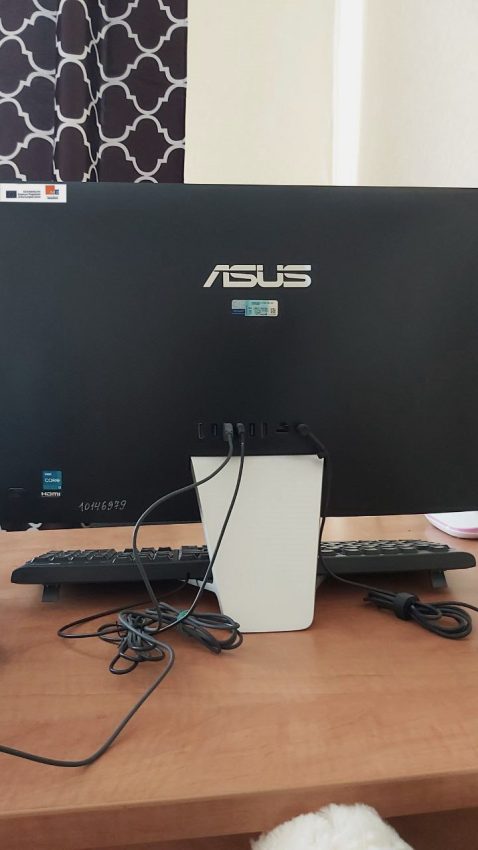
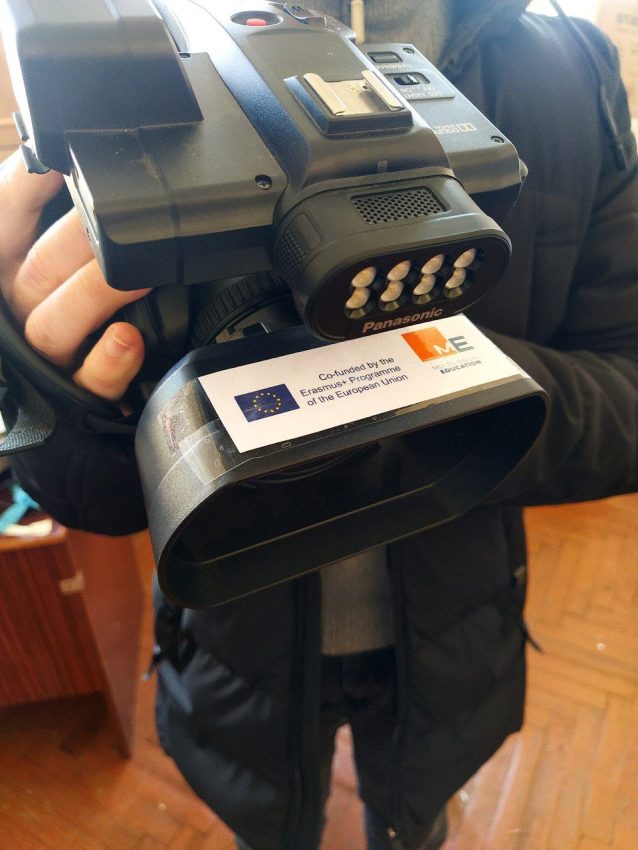

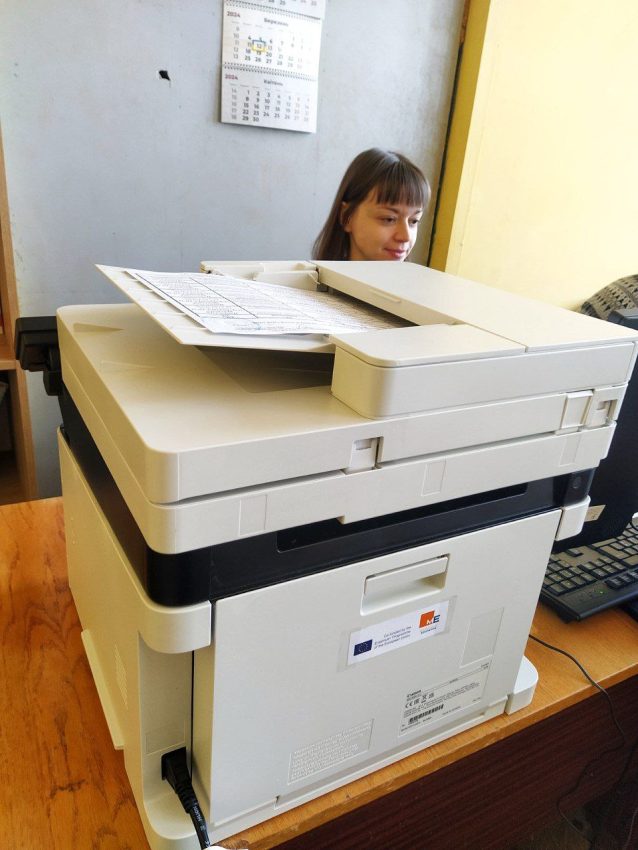



Funded by the European Union. Views and opinions expressed are however those of the author(s) only and do not necessarily reflect those of the European Union or EACEA. Neither the European Union nor the granting authority can be held responsible for them.

